

Lawyer The Arkansas



CYBER THREATS?
At Pinnacle IT, we recognize the distinctive challenges encountered by law firms, and our mission is to equip your organization with state-of-the-art technology solutions that will revolutionize your operations. With our profound understanding of the legal industry and unwavering dedication to excellence, we stand as your trusted partner in transforming your IT landscape.

Count on us to streamline your firm’s processes, enhance data security, optimize workflow efficiency, and deliver innovative solutions tailored to meet the specific demands of your legal practice. With our support, you can focus on providing exceptional legal services while relying on a robust and secure IT infrastructure to propel your success.










PUBLISHER
Arkansas Bar Association
Phone: (501) 375-4606
www.arkbar.com
EDITOR
Anna K. Hubbard
EXECUTIVE DIRECTOR
Karen K. Hutchins
PROOFREADER
Cathy Underwood
EDITORIAL BOARD
Caroline R. Boch
Turquoise Early
William Taylor Farr
Abigail Grimes
Jim L. Julian
Tory Hodges Lewis
Drake Mann
Tyler D. Mlakar, Chair
Michael A. Thompson
Brett D. Watson
Amie Schoeppel Wilcox
David H. Williams
Nicole M. Winters
OFFICERS
President
Jamie Jones Walsworth
President-Elect
Representative Carol Dalby
Immediate Past President
Kristin L. Pawlik
Secretary
Glen Hoggard
Treasurer
Marc P. Martinez
Parliamentarian
Brent J. Eubanks
YLS Chair
Samuel W. Mason
BAR ASSOCIATION STAFF
Executive Director
Karen K. Hutchins
Director of Operations
Kristen Frye
Finance Administrator/CPA
Staci Clark
Publications Director
Anna K. Hubbard
Executive Administrative Assistant
Michele Glasgow
Office & Data Administrator
Cynthia Barnes
Professional Development Coordinator
Lisa McCormick
Information Technology Specialist
Rachel Henderson
2025-2026 Arkansas Bar Association President Jamie Jones Walsworth By Anna K. Hubbard
Arkansas Bar Association Legislative Committee Report By Glen Hoggard
Artificial Intelligence in the Natural State By W. Taylor Farr
The Arkansas Uniform Trust Decanting Act: A New Chapter in Modern Trust Modification By Erin E. Behring
Act 975: Original Jurisdication in the Court of Appeals By Houston Downes
One Word, Big Impact: Strengthening UPL Enforcement Through Act 110 By Meagan Davis
Converting Damages to Reimbursement: Act 28's Insult to Injury Law By Brian G. Brooks
Act 28 Marks a Major Change in Claim Value
Adoption of Market-Based Sourcing in Arkansas Highlights Tax Risks for Firms in Other States
The Arkansas Lawyer (USPS 546-040) is published quarterly by the Arkansas Bar Association. Periodicals postage paid at Little Rock, Arkansas. POSTMASTER: send address changes to The Arkansas Lawyer, 1401 W. Capitol Ave., Suite 170, Little Rock, Arkansas 72201. Subscription price to nonmembers of the Arkansas Bar Association $35.00 per year. Any opinion expressed herein is that of the author, and not necessarily that of the Arkansas Bar Association or The Arkansas Lawyer. Contributions to The Arkansas Lawyer are welcome and should be sent to Anna Hubbard, Editor, ahubbard@arkbar. com. All inquiries regarding advertising should be sent to Editor, The Arkansas Lawyer, at the above address. Copyright 2025, Arkansas Bar Association. All rights reserved.
Lawyer


Advertise in the next issue of The Arkansas Lawyer magazine
President: Jamie Jones Walsworth; President-Elect: Representative Carol Dalby; Immediate Past President: Kristin L. Pawlik
Secretary: Glen Hoggard; Treasurer: Marc P. Martinez
Parliamentarian: Brent J. Eubanks; YLS Chair: Samuel W. Mason
Trustees:
District A1: Elizabeth Esparza, Samuel W. Mason, William M. Prettyman, Lindsey C. Vechik
District A2-A3: Payton C. Bentley, Evelyn E. Brooks, Jason M. Hatfield, Christopher M. Hussein, Michelle Rene’ Jaskolski, Sarah C. Jewell, George Rozzell, Russell B. Winburn
District A4: Kelsey K. Bardwell, Craig L. Cook, Brinkley B. Cook-Campbell, Dusti Standridge
District B: Brooke Blackwell, Randall L. Bynum, Mark Kelly Cameron, Thomas M. Carpenter, Tim J. Cullen, Bob Edwards, John A. Ellis, Bobby Forrest, Joseph Gates, Michael K. Goswami, Steven P. Harrelson, Michael M. Harrison, Jim Jackson, Anton L. Janik, Jr., Victoria Leigh, Skye Martin, Kathleen M. McDonald, J. Cliff McKinney II, Jeremy M. McNabb, Molly M. McNulty, Meredith S. Moore, John Ogles, Casey Rockwell, Lauren Spencer, Aaron L. Squyres, Caitlin C. Stepina, Danyelle J. Walker, Patrick D. Wilson
District C5: William A. Arnold, Joe A. Denton, John T. Henderson, Brett D. Watson
District C6: Bryce Cook, Paul N. Ford, Jeffrey W. Puryear, Paul D. Waddell
District C7: Kandice A. Bell, Robert G. Bridewell, Sterling T. Chaney, Ledly Jennings
District C8: Meagan E. Davis, Amy Freedman, John S. Stobaugh, Joshua R. Thane
Ex-officio Members: Judge David McCormick, Judge Chaney W. Taylor, Vicki S. Vasser, Dean Cynthia Nance, Dean Colin Crawford, Glen Hoggard, Eddie H. Walker, Jr., Karen K. Hutchins

2025 Annual Award Recipients
The Arkansas Bar Association held its 127th Annual Meeting June 11–13, 2025, at Oaklawn Resort in Hot Springs. During the awards luncheon on June 13, 127th President Kristin L. Pawlik presented this year’s recognitions, Chief Justice Karen R. Baker delivered the State of the Judiciary Address, and Jamie Jones Walsworth was sworn in as the Association’s 128th President. The program also included a special passing of the gavel ceremony led by ArkBar past presidents in attendance, symbolizing the continuity of leadership and service within the Association.
Thank you to everyone who joined us in celebrating this special event—and to our generous sponsors, listed on the inside front cover of this issue, for their support of the 127th Annual Meeting. Special thanks to Annual Meeting CoChairs Will Ogles and Chris Hussein for their leadership and hard work in making the event a success.
Mark your calendars and join us next year, June 10–12, 2026, back at Oaklawn!

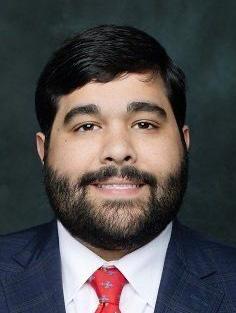
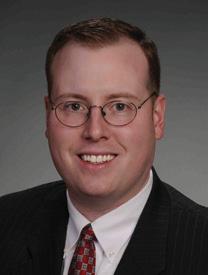
Margaret King Davis, Mock Trial Committee
Chris Hussein, Co-Chair of the 127th Annual Meeting

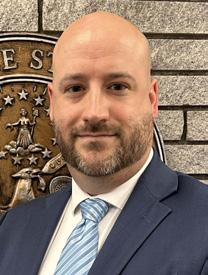
J. Cliff McKinney II, 2025 ArkBar Legislative Package
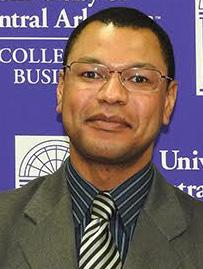
Adrienne M. Griffis, Mock Trial Committee
Adam Jackson, Mock Trial Committee
Anthony McMullen, Mock Trial Committee
Presidential Awards of Excellence

Stuart P. Miller, Exceptional Commitment

Young Lawyer Awards
G. S. Brant Perkins, Treasurer
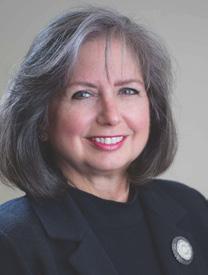
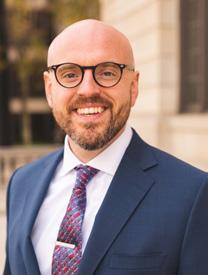

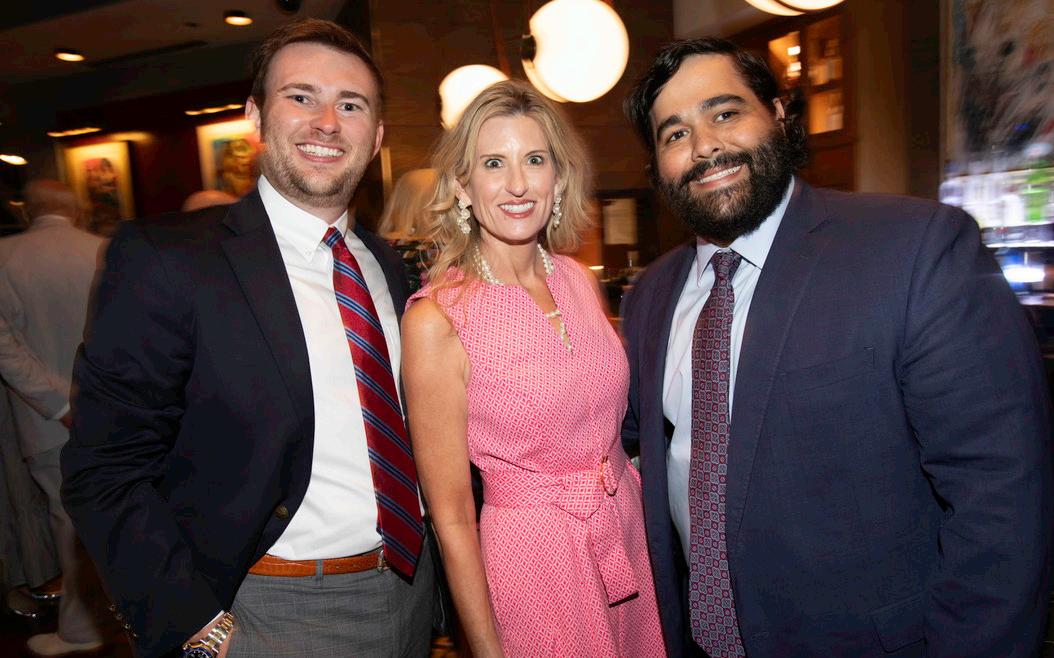
Denise R. Hoggard, Personnel Committee
Frank LaPorteJenner, Young Lawyers Section
William J. Ogles, CoChair of the 127th Annual Meeting



Maurice Cathey Award

Tyler Mlakar, The Arkansas Lawyer magazine

Samuel W. Mason, Judith Ryan Gray Service Award

Frank LaPorteJenner, Frank C. Elcan Leadership Award

Glen Hoggard, Legislation Committee Chair
Meredith Lowry, AI Task Force Chair
Aaron Squyres, Political Speech and Activities TF Chair
Charles Carpenter Memorial Award

Legislation Awards
D. Wilson, Board of Trustee

Senator Tyler Dees Representative Matthew Brown
Pictured from left to right: Will Ogles, Annual Meeting Co-Chair; Kristin L. Pawlik, 127th President of the Arkansas Bar Association; and Chris Hussein, Annual Meeting Co-Chair.
Golden Gavel Awards
Patrick
Oyez! Oyez!

Appointments and Elections
Brett Watson of Searcy was recently appointed to the Arkansas Judicial Discipline and Disability Commission. Frank Arey was recently appointed to the Federal Advisory Committee for the U.S. Court of Appeals for the Eighth Circuit.
Word About Town
Gordon and Rees has hired Senior Counsel Zachary Wilson and associates Matthew Haley and Marcos Perez. The firm is continuing its growth in Arkansas and has expanded its space in the Simmons Tower Building. Quattlebaum, Grooms & Tull PLLC announced that MiKayla B. Jayroe has joined the law firm as an associate in the firm’s Northwest Arkansas office. Wilson & Associates, an affiliate of The Wilson Law Group, is pleased to announce the launch of its new Family and Business Solutions practice area and the addition of attorney Katie Griffin who will be leading the practice. Arvest Wealth Management recently promoted Katie Pipkin to vice president, Regional Trust Manager, overseeing trust services in Central Arkansas and the River Valley.
Send your oyez to ahubbard@arkbar.com
Michele Glasgow Celebrates 25 Years with ArkBar and Announces Retirement
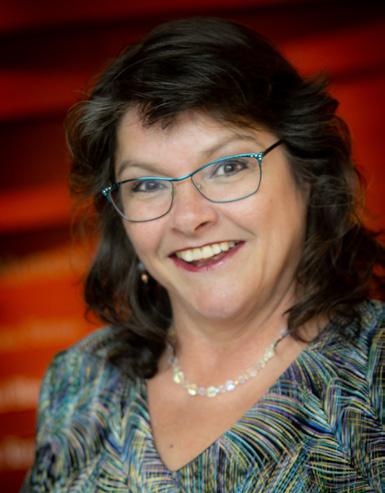
On June 26, the Arkansas Bar Association recognized Executive Administrative Assistant Michele Glasgow for reaching an extraordinary milestone—25 years of service. Michele is known for her dependability, organizational skills, and commitment to supporting our members.
In her role, Michele has supported Association leadership and worked closely with committees, helping to keep projects and initiatives on track. Her knowledge of the organization and consistent presence have made her a go-to resource for colleagues and members alike.
“Michele’s work as Executive Administrative Assistant has made her invaluable to the association leadership,” said Executive Director Karen Hutchins. “She cultivated knowledge of the Association’s governance structure and acquired a unique ability to master various technology systems. Michele’s loyalty to the association as well as her diligence in serving our members and the public was unwavering throughout her career. Her service was particularly evident in her exceptional support of the Mock Trial Committee.”
As Michele celebrates this milestone, she is also preparing for a new chapter, her retirement this October. While her expertise and sense of humor will be greatly missed, the Association is grateful for her years of service and wishes her the very best in retirement.
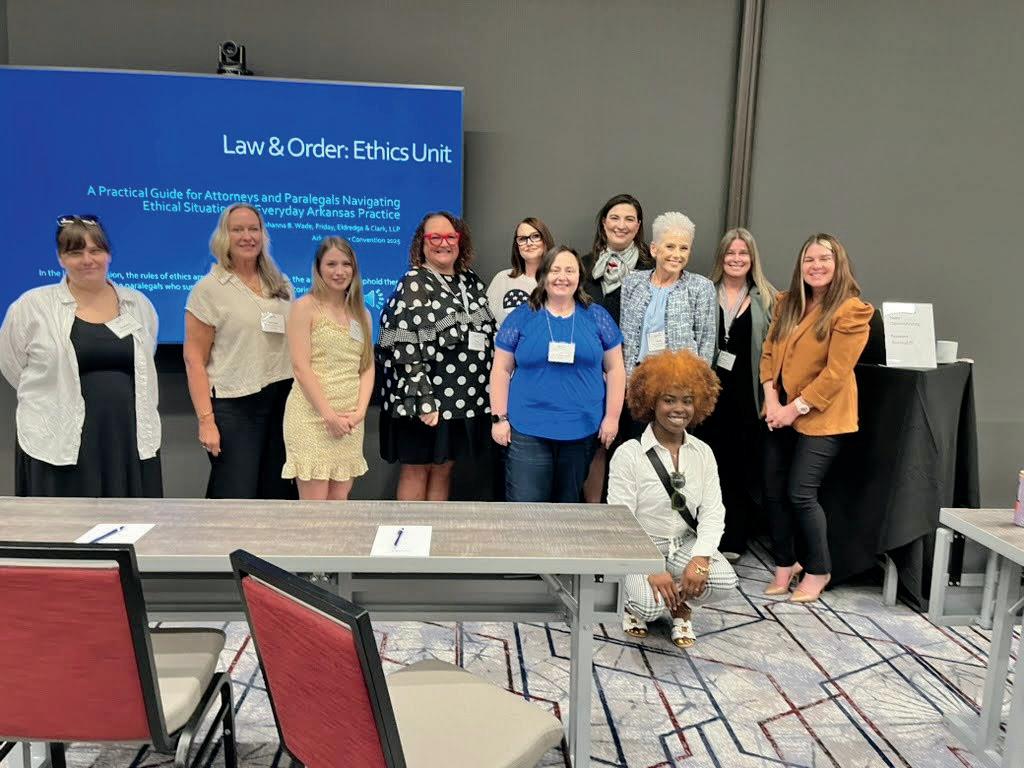














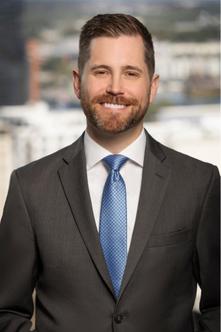
















Jenna Adams Devin Bates Christy Bjornson Dr. Riva Brown Hon. Tjuana B Manning
Hon. Cathi Compton Nate Coulter Charlie Cunningham Jennifer Donaldson Seth Hampton
Shelly Joyner Meredith Lowry Hon. Melanie Martin Candace McCown Cliff McKinney
Abtin Mehdizadegan David Slade Stephanie Vardaman Jillian Wilson Robbie Wilson
From Connection to Collaboration
If I have a focus for the year, it would be connections—connections between our members, connections between the bench and the bar, and connections between the bar and the public. Martin Luther King, Jr. said “whatever affects one directly, affects all indirectly. I can never be what I ought to be until you are what you ought to be. This is the interrelated structure of reality.” Connections thus speak directly to the mission of the Arkansas Bar Association— to support attorneys; advance the practice of law; advocate for the legal profession; foster professionalism, civility, and integrity; and protect the rule of law.
1. Supporting our attorneys: Connecting our lawyers by engagement in section membership and fostering professionalism, civility, and integrity. ArkBar conducted a survey a few years ago, and one of the conclusions made from the data is that the most satisfied member is the member who is engaged in a substantive section. Section members have a shared interest in the law, which allows members to focus on and naturally integrate the current trends, ethical issues, and shared expectations of their area of law. Engaging with others who have shared interests and with whom you practice humanizes others and encourages courtesy and civility even when engaging in the adversarial system. Sections further create a collaborative culture by creating opportunities for collegial dialogue, mutual learning and mentoring.
We will make section engagement and revitalization a priority. Sections are active engines for cultivating civility and professionalism, and supporting increased connections and relationships in your
Jamie Jones Walsworth is the President of the Arkansas Bar Association. She is a partner at Friday, Eldredge & Clark, LLP in Little Rock.
practice of law. If you are interested in being involved in a section, please let me know and I will assist you in plugging into section leadership.
2. Advancing the practice of law and the legal profession: Connecting through technology. Whether you are a solo practitioner in South Arkansas, a prosecutor in Northeast Arkansas, a big firm lawyer in Central Arkansas, or an in-house lawyer in Northwest Arkansas, keeping up with the latest trends in the law can be daunting. ArkBar has long had case law updates available through our podcast, but we have now launched ArkBar On Air: President’s Mic. This is a monthly podcast designed to connect all lawyers in the state to explore local issues and national legal trends. Our first two episodes are available now for download! Our first episode features a discussion about the Arkansas Supreme Court’s proposed rules on Artificial Intelligence, and the role the ArkBar AI Task Force played. Please reach out if you have a topic idea, or would like to recommend a guest.
3. Advocating for the legal profession and protecting the Rule of Law: As lawyers, we have been educated to understand the value of the Rule of Law and the value that the legal profession brings to our society. The general public does not always understand these principles. How lawyers behave publicly certainly influences the value of our profession. Actions indeed speak louder than words. ArkBar is uniquely situated in that it can provide education on the issues that are hotly debated—it can provide necessary context and education for the public to reach a conclusion. In June,

the Board of Trustees approved a Task Force on Public Education, chaired by Judge Brent Eubanks.
In addition, modeling behavior for the next generation of lawyers gives back to our profession, and creates a generation valuing the legal profession and the Rule of Law. ArkBar has long been involved with showing off our grand profession through the Mock Trial Program. While this program greatly benefits the high school students participating by exposing students to the legal profession and teaching them public speaking, critical thinking and argument skills, it also benefits the legal profession. Mock Trial builds a pipeline of motivated and skilled future lawyers, a true talent incubator. Mock Trial also encourages legal literacy in the students and their families, fostering a respect for the Rule of Law and informed civic participation. The lawyers, judges, and legal professionals volunteering crucially build bridges between the legal community and the public and improve the perceptions of the legal profession. Mock Trial needs several volunteers to continue to grow this program—coaching (volunteers can even coach via Zoom to underrepresented or rural communities), serving as a judge at the tournament, teaching at our upcoming Mock Trial programming in January, and sponsoring a team so they can afford materials. Contact me if you are interested in helping.
ArkBar hopes that you will continue your membership, and encourage others to join, the only organization that supports all the lawyers in the state. We really are better lawyers when we work together. ■




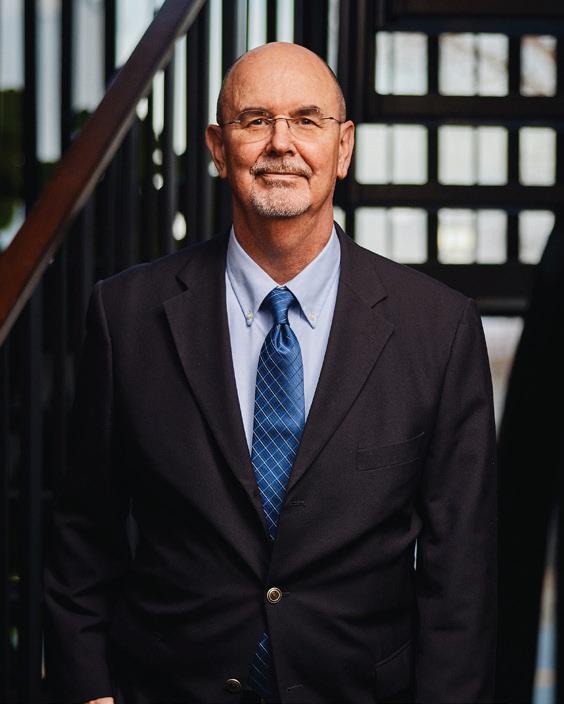




Leading Boldly. Serving Proudly. Let’s
Do This!
Let’s get this year started off right! What could be better for the Young Lawyers Section than having it comprised of some of the brightest and most hard-working and steadfast young lawyers in the state? I’ll tell you what could be better: having those same members and executives eager to serve the Bar, the practice, and, most importantly, the hard-working citizens of our beautiful state. Arkansas is in luck because that is what our Young Lawyers Section and Executive Council is comprised of this year!
So, what is the Section going to do this year? The simple answer is: the Young Lawyers Section is going to do whatever we can to help engage new lawyers, promote our services across the state, and have just enough fun to keep us young. We have books
to finish and distribute, we have clinics to help those in need, we have networking events across the state, and we have much, much more. To start off, members of the Executive Council were at both law schools’ orientations: Fayetteville on August 12 and Little Rock on August 20. We passed out some swag, mini tri-highlighters to help “highlight their journey,” and let students know that ArkBar is here to support them from 1L to JD. As this year progresses, more details will be provided of what is to come. After all, a good book is never finished in the first chapter.
However, as we all know, none of this could be possible without the outpouring of support from those behind the scenes. The Young Lawyers Section is grateful to the Bar
Samuel W. Mason is the Chair of the Young Lawyers Section. Sam is a trial attorney at the Oliver Law Firm in Rogers.
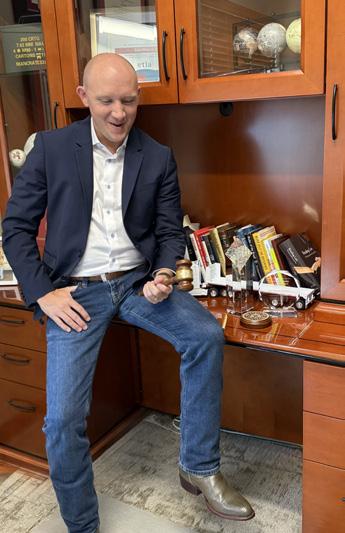
and its administration and staff who work to guide and promote the Section across the state of Arkansas. Personally, I am grateful to the staff for keeping the Section and me on track and providing us with the tools to do the absolute best job possible for those who rely on our services. Without their help, the Section would not be what it is.
In conclusion, the Young Lawyers Section is blessed to have an outstanding Executive Council for the 2025-2026 term; with a combination of our seasoned executive members and new executive members, this will be a year filled with progress and fun. You’ve probably realized by now that I am not someone who enjoys fitting the mold, so I’m asking y’all to hold on tight and enjoy the ride with me. Let’s do this! ■

Leading with Connection
Arkansas Bar Association 128th President Jamie Jones Walsworth
ArkBar President Jamie Jones Walsworth brings intentionality, energy, and heart to her role—fostering trust, building community, and finding common ground in the legal profession.

By Anna K. Hubbard
The Power of Connection
For Jamie Jones Walsworth, leadership always comes back to one thing: connection. It drives everything from her daily interactions to her long-term priorities for the legal community. On June 13, 2025, she stood before her colleagues at the Arkansas Bar Association’s Annual Meeting in Hot Springs and took the oath as the Association’s 128th President, continuing the leadership and commitment to service she’s brought to the Association for years.
In her remarks leading up to Jamie’s swearing-in, Immediate Past President Kristin Pawlik said:
“She has been an invaluable resource for this association for years. She is a consummate professional, a fierce advocate, and a trained volunteer. She knows how to get things done, and our association is so very, very fortunate to have her stepping into this role at this time with her strategic vision, thoughtfulness, and intentionality.”
From the moment she took the podium, Jones made it clear that building community would be the heart of her presidency. Whether it’s bringing lawyers together across the state, building trust within the profession, or finding common ground in moments of disagreement, she believes that strengthening those ties is imperative to the legal profession, as well as to the health of our communities.
“Mr. Rogers famously said that ‘the connections we make in the course of a life, maybe that’s what heaven is,’” Jones shares.
“I believe that connecting with our community is incredibly important to our human experience, and to the betterment of society. It’s hard to ignore the good in people if you feel a connection to them. But it’s incredibly easy to focus only on the bad and the points of disagreement when we lose that connection.”
For Jones, connection isn’t just a leadership philosophy, it’s woven into her own life story. In the last year, she reconnected with her high school sweetheart, Rick Walsworth, someone she hadn’t seen in decades. That reconnection sparked a joyful new chapter in her life, and the two recently married.
Photo: Mike Pirnique



Rebuilding Civility in the Profession
Jones believes the legal profession has a vital role in rebuilding the civility and connection that have eroded in recent years. COVID, she notes, played a part. “We became more isolated. People stopped engaging, and that hurt us, not just as organizations, but as a society.”
She sees the impact not only in declining membership across professional associations, but also in a cultural shift: a growing tendency to focus on the negative. “We’ve become too quick to find the bad in people. But people aren’t simply good or bad, they’re nuanced.”
For lawyers, she argues, recognizing that nuance is essential. Advocating fiercely in the courtroom, she says, doesn’t have to come at the expense of respect outside of it. In fact, it can make attorneys more effective. “Civility and connection go hand in hand. The more we engage with each other, the harder it is to lose sight of our shared humanity.”
By creating space for respectful debate, she hopes to restore connection and model the kind of thoughtful dialogue lawyers are uniquely positioned to lead.
She notes that while technology has made it easier than ever to stay in touch, it has also made it easier to lose the personal, human side of relationships. “We’re often communicating more, but connecting less,” she says.
To help close that gap, Jones launched ArkBar On Air: The President’s Mic, a podcast designed to bridge the geographic and generational divides within Arkansas’s legal community. “Our state is heavily rural,” she explains. “For lawyers in small towns, it’s hard to make it to events in Central or
Northwest Arkansas. I’m hopeful this is a way to connect us all—quickly and efficiently.”
Featuring timely conversations with legal professionals from across the state, the podcast offers a platform for sharing expertise, engaging in thoughtful debate, and amplifying the work of ArkBar’s sections. “The most satisfied members are those who are engaged in a substantive section,” Jones says, citing findings from an extensive membership study she chaired a few years ago. “This is one more way to support that connection, to educate, and to create space for dialogue around the issues that matter most.”
Rooted in Resilience
Jones credits much of her career path to early encouragement and opportunity. “I didn’t grow up with a lot of built-in advantages,” she says. “If I wanted something, I had to work hard for it.”
As a teenager in Rogers, she already knew she wanted to be a lawyer—even if she could barely speak in front of a classroom. “I was so shy I had to record my book reports alone in a separate room,” she recalls. Programs like Teen Court and high school drama helped her find her voice, but she found her calling as a litigator when the Benton County Bar Association sponsored her attendance of a teen legal program in Washington, D.C. through Duke University. “That was a turning point,” she says. “I’m not sure I’d be a lawyer today if they hadn’t believed in me.”
That belief took her to the University of Kansas School of Law, where she served as managing editor of the Kansas Law Review, graduating in 2003 with the highest score on
the Arkansas Bar Exam that year. She earned her bachelor’s degree in psychology, magna cum laude, from the University of Arkansas in 2000, where she was recognized as the Top Psychology Student of the Year Her early colleagues quickly recognized both her legal talent and her character. “I had the great privilege to work with Jamie at the Friday Firm and am proud to call her a friend,” says U.S. Magistrate Judge Edie Ervin. “Jamie is a talented lawyer and smart as a whip. Her equally important gifts include stellar communication skills, a commitment to service, and genuine kindness, all of which will make her an excellent Arkansas Bar President.”
From the start of her legal career, Jones immersed herself in service to the Arkansas Bar Association—serving as a tenured delegate in the House of Delegates, on the Board of Trustees, and as a member of the Board of Governors. She has chaired and served on numerous committees and task forces, including work in legal research, membership value, jurisprudence and law reform, strategic governance, and legislation. Her commitment to service also extends to the Arkansas Bar Foundation, where she is a two-term former member of the Board of Directors and continues to serve as a Fellow, and to national leadership through the Federation of Defense & Corporate Counsel, where she holds leadership roles and was recognized in 2021 for her leadership. She is also a past president of the Arkansas Association of Defense Counsel, and in 2017 Arkansas Business named her to its “40 Under 40” list.
From left to right: Jamie and Arden (Photo: Vincent Jackson); Jamie and Rick (Photo: Lizzy Yates); Jamie (Photo: Mike Pirnique).

The Friday Firm Legacy
That commitment to service only deepened when Jones joined Friday, Eldredge & Clark LLP in Little Rock, where she is now a partner in the litigation practice group and serves on the Firm’s Management Committee. Bar involvement and community engagement are woven into the fabric of the Friday Firm, and from her first day, she was immersed in that culture.
During law school, then-managing partner Buddy Sutton invited her to a lunch interview. They talked about college football for three hours. “Mr. Sutton then flew me down a few weeks later to meet with the firm, and when they offered me the job, I accepted immediately,” she recalls. “The Friday Firm encourages you to be engaged, not just in your practice, but in the profession.”
Jones says she has been “raised” by the lawyers and staff at the firm, who valued her voice from day one. “Even as a brand-new lawyer, I was expected to have an opinion and be part of the discussion, and my colleagues with decades of experience would stop and listen, explaining where I was wrong or validating when I was right,” she says.
She credits mentors like Fred Ursery and Kevin Crass for modeling what it means to lead with purpose. “Fred basically told me I was going to be president of the Bar,” she laughs.
Ursery, a longtime colleague, remembers her early days well:
“Jamie joined the Friday law firm in 2003. She chose to be in the litigation section, which gave me the opportunity to work with her. I knew she would be a good writer because she had been the editor of the law review. Then Jamie and I tried several jury
trials together and she demonstrated the attributes of a good trial lawyer. Shortly after she joined the firm, I served as President of the Arkansas Bar and encouraged her to participate in bar activities. She handled a number of projects and was active in numerous civic efforts alongside her bar work. As the old saying goes, ‘If you want something done, give it to a busy person.’ She has the energy of three people. I would always want her on my team. I have no doubt she will do a great job as our Bar President.”
Jamie recalls that their shared love of animals helped them connect early on. “Not long after I started, I ran into Fred and his wife, Sharon, at the pet store. I was there picking up something for my dog and ended up adopting a kitten on the spot. When Fred realized I was an animal lover too, he started using me more in his cases,” she laughs, adding, “I was very lucky to gain him as a mentor, and frankly, a best friend.”
Crass, also a member of the Friday Firm Management Committee, echoes Ursery’s praise:
“From the time Jamie joined our firm, she was a self-starter with a drive to excel. If you gave her an assignment, you could count on a high-quality response. She also brought a high level of enthusiasm to become a go-to lawyer, and it did not take her long to reach that goal. At the same time, she took on leadership roles in the firm, the bar, and the community. I honestly don’t know how she has the time to do it all, especially given her commitment to her daughter. I am very proud of her, and I believe the Arkansas Bar Association will continue to benefit from her leadership.”
Jamie says her years working alongside Crass have shaped how she sees her role in
the community. “Kevin does a lot of business and class action litigation, so I worked closely with him from the start. He never had to tell me to be engaged in the community; it was something I learned by watching him. Community is important to Kevin, and how he spends his time makes that obvious. It’s given him a broader perspective that I think makes him a better problem-solver, and I’ve tried to carry that lesson forward in my own work.”
Her election as ArkBar President also continues a proud tradition for the Friday Firm. Three of her predecessors—founding member Herschel H. Friday (1976–77), Fred Ursery (2004–05) and Jim Simpson (2013–14)—once held the same role, continuing the firm’s long history of service and deep connection to the Association.
A Lesson in Service
Jones’s commitment to service reaches far beyond the legal profession. She is the Immediate Past Chair of the Board of Directors for the American Heart Association, Central Arkansas (2023–2025), and immediate Past President of the National Charity League, Little Rock Chapter. Her past community leadership includes board roles with the Arkansas Museum of Fine Arts, the Junior League of Little Rock, and the Little Rock Chamber of Commerce’s Leadership Greater Little Rock.
She hopes her daughter, Arden, grows up with that same sense of empathy and responsibility. “I want her to always include service to others in her life,” she says. “It’s important not to get so isolated in your thinking that you believe only your perspective matters.”
Motherhood, she adds, has made her a better lawyer and leader. “You look at the world differently and consider issues from the perspective of others. It’s a reminder that I am but a part of a larger community and I have responsibilities that go beyond my personal wishes for the world.”
When Arden looks back on these years, Jones hopes she remembers: “That I would listen to others before I make a decision. That she can do anything. That being a mom, or a wife, or a lawyer is part of who I am—but I am the collective of all my roles.”
Jamie is intentional about modeling that approach. “I very much subscribe to the John
Jamie receives the gavel from ArkBar Past Presidents (Photo: Mike Pirnique)
Wesley philosophy: ‘Do all the good you can, by all the means you can, in all the ways you can, at all the places you can, at all the times you can, to all the people you can, as long as ever you can.’” By including Arden in her work and volunteer life, she hopes to share both her values and a real-world example of serving others.
A Love of Reading
For Jones, another form of connection, and a way to recharge, comes through books. Known for her thoughtful and candid book reviews on social media, she once read as many as 15 books a month. While she may not post or read quite that volume these days, she still averages a couple of books a week.
“I’ve always been a big reader,” she says. “For me, it’s an important part of my mental well-being. It helps me turn my brain off at night from all the obligations and stress I have going on. It gives my mind a break from whatever I was problem-solving that day.”
What began as a personal outlet evolved into a surprising way to connect with others. Friends encouraged her to start posting recommendations, and soon people she barely knew were stopping her in the grocery store to talk about a book she had reviewed. At a national legal conference, two women she’d never met rushed up to greet her, exclaiming, “You’re JJ Reads a Lot!”
“That’s the great thing about books,” Jones says. “They let you see the world from a different perspective for a while. And they give you something to share with people you might not otherwise connect with.” Jamie is excited to launch the ArkBar Presidential Book Club as a way to connect members and engage in meaningful conversation.
The Role of the Bar Today
With the rise of national CLE providers, some offering free or low-cost content, Jones sees a clear distinction in what the Arkansas Bar Association offers. “We provide content that’s specific to practice in Arkansas, and often presented by the judges our members appear before. Nothing takes the place of hearing directly from the judge who’s going to be on the bench in your upcoming case.”
At a time when public trust in the legal system is under strain, Jones sees the Bar Association as uniquely positioned to help restore confidence. “We can educate the
public on hot topics in the legal community without taking an opinion,” she said. “We can increase public perception in a positive way of lawyers, judges, and the legal community.”
To that end, she announced the formation of a Public Education Task Force, chaired by Judge Brent Eubanks, to explore new opportunities for community outreach and civic education. The Task Force is already working with the New Civic Education Center on several upcoming projects. She has appointed a CLE Task Force, chaired by Michelle Jaskolski, to help the Association stay responsive to the changing needs of Arkansas lawyers. “We’re proud to be a leader in Arkansas-specific CLE,” she said, “but we also know the market is evolving.”
Looking ahead, she encouraged members to mark their calendars for the 2026 Annual Meeting, scheduled for June 10–12. Judge Shawn Johnson of Pulaski County and Judge Joe Volpe of the Eastern District of Arkansas are already hard at work planning what promises to be a meaningful and forwardlooking gathering.
Johnson brings both community focus and experience from other member-driven organizations, including his leadership in Cub Scouts. “He’s extremely communityoriented, and I think we share that desire to be connected to the community,” Jones says. “He’s already bringing great ideas, and he and Judge Volpe are certainly willing to flip the script a little bit and try new things.”
In Johnson’s words: “Today, social media and the tech-driven strategies for navigating our daily lives—e.g., on-demand television, instant Google answers, ChatGPT, and the social-media algorithms, etc.—are creating pressures and anxieties in our society. While they may make some things more efficient, they also make us over-busy and overstimulated and prevent us from joining in community activities like more people have done in past eras. It thus isolates us into our own echo chambers. Hence, choosing community and helping our friends and neighbors is needed now more than ever.
“In guiding the planning of next year’s annual meeting, Jamie is embracing solutions to this very concern. As lawyers, we are called to serve not only our clients but our communities. Next year’s annual meeting will focus on encouraging lawyers to serve

their communities and to care for themselves in the process. Jamie’s appreciation for innovation and change is inspiring. All members of the Arkansas Bar should get ready for a great, updated experience (yes, an ‘experience!’) at the 2026 annual meeting.”
Looking Ahead
As she steps into this next chapter of leadership, Jamie brings the same intentionality, energy, and belief in people that have defined her journey so far. She knows leadership isn’t about checking boxes, it’s about listening first, building trust, and making decisions with clarity.
“I used to think that to be a leader, you had to be a certain age or meet a certain criterion,” she reflects. “Now, I realize that leadership comes in many ages and experience levels. It’s about processing information effectively, owning your decisions, and surrounding yourself with people who will challenge and support you.”
For her, the most rewarding moments are the connections she’s built, bridging differences in background, perspective, and practice area to find common ground. “You do not become forceful until you listen to your team,” she says. “I rely on a diverse group of individuals to give me the data and perspective I need to lead.”
And to the next generation of lawyers just starting out, her advice is simple and lasting: “Surround yourself with great people—they’ll make you look good.” ■
Jamie announces the launch of her President’s Mic Podcast. (Photo: Vincent Jackson)
By Glen Hoggard
Arkansas Bar Association Legislative Committee Report

The Arkansas Legislature adjourned sine die, Monday, May 5, 2025, drawing to a close the 95th Regular Session of the General Assembly. I offer this report to the Bar membership regarding the results of this Session and the Arkansas Bar’s participation in it.
One of the significant aims of the Arkansas Bar Association is Legislative Advocacy on behalf of the legal profession and the fair administration of justice. The Bar has established a detailed process to both advocate for bills sponsored by the Association, as well as to review legislation introduced by others.
It was my high honor this session to serve as Chair of the Committee, concluding my tenth year of service on ArkBar Legislation. This report is authored from my perspective as Chair and certainly is not intended to represent the opinions of the entire Committee.
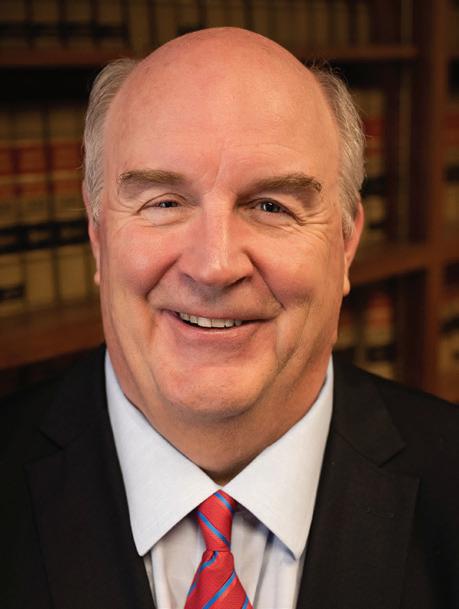
Glen
Hoggard has served as the Chair of Arkansas Bar Association's Legislation Committe.
Starting a year before the current Legislative Session, ArkBar’s Jurisprudence Committee solicited and reviewed legislative proposals for the purpose of including those proposals in the Bar’s legislative package. Jurisprudence selected five pieces of legislation for introduction to the General Assembly. Four of the five proposals were submissions of the Uniform Law Commission. The fifth proposal was the result of a joint Committee of the Association’s Real Estate and Natural Resources Sections.
The five bills were all passed and enacted into law under the Governor’s signature. The bill and act numbers, along with a brief description are:
HB 1736 & HB 1746: both ULC bills and both amending Article 9 of the Uniform Commercial Code, one bill adopting the 2018 promulgated amendments and one the 2022 amendments; they are now Acts 603 and 997, respectively.
HB 1737: from the Title Standards Committee, amending the Transmitting Utility Act, this bill enacted a process for filing multi-county liens with the Secretary of State’s office on conduit and fiber optic installations in public rights of way; now Act 584.
HB 1739: adopting the Electronic Materials Act, this ULC submission was proposed and supported by our two law school’s law librarians. It creates a process for a public record of electronic materials, such as state agency rules and regulations. Now Act 814.
HB 1749: adopting the Uniform Trust Decanting Act, this ULC submission was passed without opposition. It permits the pouring over of a Trust’s Assets into a new Trust with modified Trust provisions and is now Act 680.
The Committee adopted positions on eight pieces of Legislation and two Joint Resolutions (proposed state constitutional amendments). The Committee observes a mandate of only advocating on legislation that either directly affects the legal profession or that addresses the fair administration of justice. Those bills, our position, and the result are shown below.
HB 1204: neutral; this bill limited the manner in which healthcare costs could be presented to a jury in an injury action. Now Act 28.
HB 1282: support; made the payment of benefits to anyone soliciting a case for an attorney illegal as the unauthorized practice of law. Now Act 110.
HB 1468: oppose; established a new process for claims against home improvement companies, home builders, and suppliers with new timelines and ADR processes. Now Act 558.
HB 1533: oppose; established a Decentralized Unincorporated Nonprofit Association regimen. Died in House Committee.
HB 1656: oppose; amended the law regarding oil and gas royalty calculation. The Committee opposed because the bill attempted to alter existing contracts via legislative enactment. After being defeated in Senate Committee, the bill was significantly amended at the very end of the Session and passed. Now Act 1024.
HB 1679: opposed, then support as amended. The bill amended the ULC
Anatomical Gift Act, a prior legislative proposal sponsored by ArkBar. Following significant negotiations with the Sponsor and the bill’s interested parties, amendments were adopted that satisfied the major concerns. Now Act 861.
HB 1832: opposed: made the Court of Appeals the court of original jurisdiction for facial constitutional challenges to state and federal statutes. This bill seeks to amend rules promulgated under Amendment 80 to the AR Constitution. Amendment 80 was a significant legislative and electoral effort by ArkBar that was passed in 2000. The Committee voted to oppose, believing Amendment 80 cannot be altered by a legislative action. The bill’s sponsor did agree to amend the bill to set a November 1st effective date to permit the adoption of rules and processes for implementation. Now Act 975.
SB 629: oppose; created an exemption to the statute on the unauthorized practice of law and allowed certain corporate entities to be represented by a corporate officer in eviction actions. Died in House Committee.
HJR 1015 and SJR 13: oppose; these


proposed constitutional amendments mandated or permitted, respectively, the use of political party labels in judicial elections. Amendment 80 made judicial elections nonpartisan. Joined by the Judicial Council, President Pawlik offered Committee testimony opposing the amendments. Both died in their respective Committees.
There were numerous other bills where the Committee made inquiries to the Bar’s Sections and members of expertise in their field. There were numerous bills where concerns or requests for changes were expressed to Legislators and those requests were honored.
In all, it was a highly successful year for Bar Association legislative advocacy. Special thanks to Rep. Matt Brown, a practicing attorney from Conway, for sponsoring the Bar package and to the members of Government Consulting for their lobbying advocacy and intelligence on behalf of the Bar. The 11 members of the Legislation Committee are to be commended for their efforts and service to the Bar Association. It was a privilege to serve with this outstanding and distinguished group. ■


261 Peninsula Dr - Lake Hamilton, Hot Springs
Artificial Intelligence in the Natural State
By W. Taylor Farr


W. Taylor Farr is an Assistant Professor of Law at William H. Bowen School of Law. He also serves as an attorney advisor in the Clerk's Office of the U.S. Court of Appeals for the Eighth Circuit. His comments do not necessarily reflect the views of his employers.
Acouple of issues ago, The Arkansas Lawyer covered how generative artificial intelligence is shaping our profession, from our practices to our ethical obligations to the education of our future colleagues. Thus, it seems fitting that we discuss briefly how generative artificial intelligence is making its way into our statutory law.1 From this author’s review, it appears 13 bills were introduced this legislative session that contained the phrase “artificial intelligence.” On one hand, this is not a surprisingly high number given the technology’s grasp on the current zeitgeist—in fact, some may find it surprisingly low. But consider that the phrase has been in our lexicon since the 1960s and has not once appeared in Arkansas statutes.2 Of the 13 bills that were introduced, only four passed.3
My Input, My Output. Arkansas appears to be an early mover in enacting Act 927,4 which delineates the ownership rights to trained models and generated content. In short, it prescribes that the person who provides the data to train the model owns the resulting model and the person who prompts the program owns the resulting content. The caveats? Ownership rights do not attach if the data was obtained, or the content was generated, in violation of existing intellectual property rights.5 And if the prompter is working at the behest of his or her employer, the employer owns the output.
Deep “Franks.” Act 1596 amends the Frank Broyles Publicity Rights Protection Act of 2016, Ark. Code Ann. § 4-75-1101 et seq. (the Frank Broyles Act), which establishes a property right in, and prohibits another’s commercial use of, an “individual’s name, voice, signature, photograph, [and] likeness.” 7 Act 159 simply clarifies that the Frank Broyles Act captures any appropriation of an individual’s likeness, photograph, and voice created through artificial intelligence. While explicit language in statutes is generally preferred, it is unclear whether this language gives any more bite to the prior version of the Frank Broyles Act. Its previous terms likely encompassed such creations anyway.8
Government Guidelines. Act 8489 amends Ark. Code Ann. § 25-1-128 and in part requires public entities to “[c]reate an artificial intelligence and automated decision tool policy” that requires a human to exercise independent judgment in making the final decision for the entity whenever such tools are used. Of particular note, Act 848 defines the ever-changing technology by appropriating language similar to the language Congress adopted in 2021: “[A] machine-based system that can, based on a given set of humandefined objectives, make predictions, recommendations, or decisions influencing a real or virtual environment.”10
Child Pornography. Act 97711 amends the Arkansas Protection of Children Against Exploitation Act of 1979 to criminalize the creation of child pornography through the use of artificial intelligence. Defendants have historically challenged these types of statutes on First Amendment grounds with varying success.12 But courts have been reluctant to wholly strike down similar laws, recognizing the harms children suffer when they are used in the creation of such content or are the subject thereof.13 To protect Act 977 from First Amendment attacks, the legislature carved out depictions that are “drawing[s], cartoon[s], sculpture[s], or painting[s]” and criminalized only instances where the
depiction is “indistinguishable from the image of a child,” considerations analogous to those which courts outside of Arkansas have relied upon in finding similar statutes constitutional.14
In Memoriam. Though each of the following were “only a bill,” it is worth highlighting the proposed legislation that died at the end of the session or was withdrawn to see what type of artificialintelligence laws might be on the horizon. The legislature proposed bills to restrict certain artificial-intelligence use in the healthcare industry,15 develop artificialintelligence literacy goals in schools,16 prohibit deepfakes in election-related content17 and in sexually explicit content involving adults,18 and protect children while online.19
In conclusion, this legislative session was an interesting microcosm of our nation’s broader conversation on artificial intelligence.20 What will be more fascinating is observing whether such artificial-intelligence legislation is merely in vogue or is the start of a persisting trend of states seeking to directly regulate an exponentially evolving technology.
Endnotes:
1. Significantly more could be said about how generative artificial intelligence is affecting our substantive law, but that topic is for another article for another day.
2. And, based on this author’s review, it has not appeared even in proposed legislation.
3. Five died at the end of the session. Four were withdrawn, two of which appear to have been withdrawn in order to introduce similar legislation.
4. 2025 Ark. Acts 927.
5. These rights are currently being litigated. For example, three book authors sued Anthropic PBC, the creator of Claude, after the company used their works to train its models. In short, Anthropic obtained over seven million pirated copies of books from online libraries. However, seeking a morelegal approach, Anthropic later purchased millions of books, ripped them apart, scanned them, and copied them for training purposes. The United States District Court for the Northern District of California recently granted partial summary judgment in favor of
Anthropic, finding that its “print-to-digital” copying of the purchased books and its use of such copies to train the large language model supporting Claude were permissible under the fair-use doctrine. See generally Bartz v. Anthropic PBC, ___ F. Supp. 3d ___, 2025 WL 1741691 (N.D. Cal. June 23, 2025). However, it denied summary judgment with regard to Anthropic’s download and retention of the pirated copies, noting that no amount of subsequent transformation could bless Anthropic’s initial download and retention as permissible fair use. See id.
6. 2025 Ark. Acts 159.
7. Ark. Code Ann. § 4-75-1104 (2016).
8. Indeed, anecdotally, the author used the prior version of the Frank Broyles Act to successfully remove an artificial-intelligencegenerated deepfake video of a client from an internet platform. Act 159 may illustrate a broader phenomenon in our profession: it seems that many are racing to pass artificialintelligence specific rules and regulations even when current rules or regulations adequately account for the technology. Maybe such movers are uncomfortable with how a court might approach the topic or simply want certainty in the law.
9. 2025 Ark. Acts 848.
10. See for comparison 15 U.S.C. § 9401. It will be interesting to see if this definition will need to evolve with the technology. What happens when artificial intelligence agents begin defining their own objectives based on trends they observe in the provided data?
11. 2025 Ark. Acts 977.
12. See, e.g., Ashcroft v. Free Speech Coalition, 535 U.S. 234 (2002) (holding that virtual child pornography enjoys First Amendment protection).
13. See, e.g., United States v. Anderson, 759 F.3d 891 (8th Cir. 2014) (holding that, while morphed child pornography—that is, an image of a minor’s face superimposed on an adult’s body engaged in sexually explicit conduct—was protected by the First Amendment, the criminal prohibition of defendant’s conduct was constitutional when it was narrowly drawn to serve the government’s compelling interest of protecting an identifiable minor).
14. See Ashcroft, 535 U.S. at 234 (noting that “pornography depicting actual children can be proscribed” (emphasis added)); Brasse v. State, 333 A.3d 593, 609, 610 (Md. App. Ct.
2025) (“To the extent that images are created by artificial intelligence using an actual child’s face, the same concerns involved with morphing exist. Such images, to the extent that they are indistinguishable from an actual and identifiable child, implicate the interests of an actual child, who is subject to the type of reputational and emotional harm that justifies their exclusion from protection under the First Amendment.” (emphasis added)); see also State v. Fingal, 666 N.W.2d 420, 425 (Minn. Ct. App. 2003) (finding Minnesota’s computer-generated child-pornography prohibition constitutional under the First Amendment because under the statute the “visual depiction must be of an identifiable minor, not a virtual child” (emphasis added)). On the other hand, it is not readily apparent that—like these other statutes—Act 977’s language criminalizes only depictions of an actual, identifiable child. “Child” is simply defined as “any person under eighteen (18) years of age,” Ark. Code Ann. § 5-27-302, without an explicit requirement that the child be identifiable.
15. See, e.g., H.B. 1297, 95th Gen. Assemb., Reg. Sess. (Ark. 2025); H.B. 1816, 95th Gen. Assemb., Reg. Sess. (Ark. 2025).
16. See H.B. 1283, 95th Gen. Assemb., Reg. Sess. (Ark. 2025).
17. See H.B. 1041, 95th Gen. Assemb., Reg. Sess. (Ark. 2025).
18. See H.B. 1823, 95th Gen. Assemb., Reg. Sess. (Ark. 2025).
19. See, e.g., H.B. 1726, 95th Gen. Assemb., Reg. Sess. (Ark. 2025).
20. The conversation was almost cut short. The One Big Beautiful Bill Act initially contained a 10-year moratorium on most state regulation of artificial intelligence. See H.R. 1, 119th Cong. § 43201(c) (as passed by House, May 22, 2025). In the end, Congress removed the moratorium, leaving the states to individually regulate the technology. See H.R. 1, 119th Cong. (2025) (enacted). On one hand, this allows more experimentation within artificial-intelligence regulation among the states. On the other, it may simply shift the regulatory power to the most aggressive states, forcing artificial-intelligence companies to build their programs in ways that are compliant with the most stringent state laws. ■
The Arkansas Uniform Trust Decanting Act: A New Chapter in Modern Trust Modification
By Erin E. Behring

Erin E. Behring, J.D., LL.M., is a senior trust officer at Regions Bank in Little Rock and manages a wide variety of accounts specializing in complex family matters.
Erin does not practice law for Regions Bank or its subsidiaries. Rather, the information and observations presented in this column are hers alone, are general in nature, and should not be considered legal, accounting or tax advice from Behring, Regions or any related entity.
The concept of decanting has been around since 1940 when a Florida court in Phipps v. Palm Beach Trust Co. held that “the power vested in a trustee to create an estate in fee includes the power to create or appoint any estate less than a fee unless the donor indicates a contract intent.”1 Arkansas made its first attempt at decanting with the approval of Act 293 (“2023 Act”)2 and earlier this year in April 2025, the Uniform Trust Decanting Act 680 (“2025 Act”) was adopted. This legislative update represents a significant step forward in the flexibility and administration of irrevocable trusts. Arkansas law has become more aligned with a growing national trend of offering trustees clearer, more comprehensive authority to modify trust structures and conform with the Uniform Law Commission’s version.
This article will examine the 2023 Act and compare it to the newly enacted 2025 Act, discuss issues that have arisen in other jurisdictions, and highlight practical considerations for attorneys and trustees in navigating trust decanting.
I. Decanting as a Tool of Trust Modification
The concept of trust “decanting” takes its name from the act of pouring wine from one vessel into another, leaving the sediment behind. In the legal context, decanting refers to a trustee’s authority to distribute assets (all or part) of an existing irrevocable trust into a new trust with different terms without approval. Decanting allows trustees to adjust the terms of an irrevocable trust, often to fix drafting errors, consolidate trusts, address tax concerns, clarify ambiguities, or accommodate beneficiary needs. While traditionally the modification of irrevocable trusts required court approval or the consent of all beneficiaries, decanting provides a nonjudicial alternative that is more flexible and cost-effective.
II. Act 293 (2023): Arkansas’s First Foray into Decanting
Decanting has been allowed in Arkansas since 2023 when Act 293 was approved and later codified as Ark. Code Ann. § 28-73-818.3 While scant in nature compared to the later-adopted 2025 Act, coming in at barely six pages, it did set up a basic framework for a trustee to make changes to a trust. The 2023 Act gave trustees authority to decant irrevocable trusts, provided they had discretion over income or principal distributions.4 This authority is seen as an exercise of a limited/nongeneral power of appointment rather than a power to modify.5 The 2023 Act does allow for beneficiaries to be excluded, but adds some protection in not allowing
any to be added to the new trust.6 The 2023 Act also specifically protects the tax status of certain trusts by limiting decanting where the original trust has utilized a marital deduction or charitable deduction, or where there is a grantor-retained annuity trust interest.7 Under the 2023 Act, notice is not specifically required, with the statute stating, “a trustee may give notice.”8 The statute does explicitly allow for the second trust to be considered special needs.9
While the 2023 Act represented progress, it was narrow in scope. It offered limited guidance on making changes in the administration of the trust, lacked provisions addressing potential tax consequences, and did not distinguish between degrees of trustee discretion.
III. The Arkansas Uniform Decanting Act (2025): Expanded Authority and Clearer Guidelines § 28-78-101
Earlier this year Arkansas adopted a version of the Uniform Trust Decanting Act drafted by the Uniform Law Commission.10 This legislation provides a more comprehensive statutory framework for decanting. It is much more robust than the 2023 Act and offers clear direction to Arkansas trustees.
Under the 2025 Act the trustee is empowered with the authority to modify the original trust if they have discretion only over principal.11 This is a significant difference from the 2023 Act, which as noted above allows for the trustee to decant if they have discretion over income or principal. The 2025 Act applies to primarily an irrevocable trust12 administered under Arkansas law unless expressly prohibited by the trust instrument or for trusts held solely for charitable purposes.13 The 2025 Act specifically requires the trustee to act in accordance with the original trust’s intended purpose.14 As in the 2023 Act, there is no implied duty to exercise the decanting power.15
Another major difference between the two decanting statutes is that notice is required under the 2025 Act.16 The statute has specific and detailed requirements for the form of the notice and a default 60-day notice period.17 The 2025 Act limits decanting when attempting to change compensation, add liability/indemnification language, and modify trustee removal provisions.18
The 2025 Act makes a distinction between limited and expanded discretionary authority and directly affects what aspects of the trust may be modified in the decanting process.19 Expanded authority requires discretionary language such as “sole” or “absolute trustee discretion.” This expanded authority allows the trustee to make a number of changes, including: eliminate one or more current beneficiaries (but not add); change the standard for distributions; add spendthrift provisions; and change administrative provisions.20 Limited refers to the very common ascertainable standard language of health, education, maintenance, or support (“HEMS” standard). When this language is present, the trustee can make administrative changes but is required to retain “substantially similar” interests for the beneficiaries when making modifications.21 These discretionary authority distinctions are a significant departure from the 2023 Act, which allowed the trustee to make extensive modifications.

While the 2023 Act mentioned the ability of decanting to cover special needs trusts, the 2025 Act provides more details and particulars.22 There are also much broader provisions for the protection of charitable interests.23 The 2025 Act adds additional limitations on modifications where the original trust includes Irrevocable Life Insurance Trusts utilizing Crummey notices, Generation-skipping trusts, S Corporation Stock, qualified benefits, or Grantor Trusts.24 Man’s best friend was not forgotten in the 2025 Act, specifically allowing for decanting into a new trust to add for care of animals.25 The Act allows for the second trust to have a different duration with some limitations on the rule against perpetuities.26 The 2025 Act also includes a savings clause and directions on later-discovered property.27
IV. Act
293 vs. the New Uniform Decanting Act
Feature 2023 Act (§ 28-73-818) 2025 Act (§ 28-78-101)
Trustee Authority Principal or Income Principal only Trustee Discretion No distinction Differentiated: limited vs. expanded
Notice Requirements Trustee may give notice Required
Tax considerations Silent Explicit protections Beneficiary Elimination Allowed Allowed
V. Experiences from Other Jurisdictions
Although this author is unaware of any Arkansas cases discussing or challenging decanting, there are plenty of other states that have experienced the pitfalls and issues that can arise.28 Trustee’s authority to decant has been a major litigation issue. In a 2017 Massachusetts case the court held that the power to decant does not need to be expressly stated in trust.29 The court looked to the discretionary authority the trustee had over the income and principal and the trustee’s “full power to take any steps and do any acts which he may deem necessary or proper.” In this case the trustee decanted the assets of a trust to a spendthrift trust outside the reach of the beneficiary’s spouse and the court surprisingly upheld the decanting as valid even though it defeated his marital support obligation. Caution should be taken in utilizing this
Landex Research, Inc.
PROBATE RESEARCH

Missing and Unknown Heirs Located No Expense to the Estate
Endnotes:
1. Phipps v. Palm Beach Trust Company, 142 Fla. 782, 196 So. 299 (1940).
2. Ark. Code Ann. § 28-73-818.
3. Ark. Code Ann. § 28-73-818.
4. Ark. Code Ann. § 28-73-818(c)(1).
5. Ark. Code Ann. § 28-73-818(k).
6. Ark. Code Ann. § 28-73-818(c)(1).
7. Ark. Code Ann. § 28-73-818(d).
8. Ark. Code Ann. § 28-73-818(h)(1).
9. Ark. Code Ann. § 28-73-818(s).
10. ULC “The Uniform Trust Decanting Act” (2015 and 2018).
11. Ark. Code Ann. § 28-78-102(3).
12. Revocable trusts where consent of a trustee or an adverse party is required may also be decanted.
13. Ark. Code Ann. § 28-78-103.
14. Ark. Code Ann. § 28-78-104(a).
15. Ark. Code Ann. § 28-78-104(b).
16. Ark. Code Ann. § 28-78-107.
17. Ark. Code Ann. §§ 28-78-107 and -110.
18. Ark. Code Ann. §§ 28-78-115–118.
19. Ark. Code Ann. §§ 28-78-111–112.
20. Ark. Code Ann. § 28-78-111.
21. Ark. Code Ann. § 28-78-112(c)(2).
22. Ark. Code Ann. § 28-78-113.
23. Ark. Code Ann. § 28-78-114.
practice as an attempt to defeat creditor claims.
The ability to decant into a special needs trust has also been challenged. For instance, the New York Attorney General argued that the new trust was a self-settled trust requiring payback provisions that a third-party trust does not require.30 The court in the case upheld that since the beneficiary’s withdrawal right had not vested the principal of the original trust was not a countable asset of the beneficiary and, therefore, the new second trust was not a countable asset of the beneficiary.
VI. Practical Considerations for Arkansas Trustees and Attorneys
Arkansas attorneys and trustees now have a number of options at their disposal when wanting or needing to make modifications to a trust document. Determining the trustee’s discretionary authority is the first step in determining which statute or modification route best fits the situation. This determination will then set out the ground rules—whether sparse or detailed—on the notice and
documentation required. Decanting could be a minefield for even the knowledgeable estate planning attorney and careful attention should be paid to the proper authority, limitations, and tax implications. If decanting does not fit within the needs or circumstances at play, there are always the more time-tested avenues of modifications that can be utilized: nonjudicial modifications (settlor is living and consent of everyone), judicial modifications (settlor deceased and consent of all beneficiaries) and nonjudicial settlement agreements (consent of all interested parties).
Conclusion
The adoption of the two Arkansas decanting statutes reflects a broader national trend toward greater flexibility in trust administration. Trustees are now empowered to update irrevocable trusts to make necessary changes. However, as with any powerful tool, attorneys and trustees are advised to carefully plan and execute trust decanting to avoid unintended legal or tax consequences.
24. Ark. Code Ann. § 28-78-119(b).
25. Ark. Code Ann. § 28-78-123.
26. Ark. Code Ann. § 28-78-120.
27. Ark. Code Ann. §§ 28-78-122 and -126.
28. Sour Grapes: When Decanting Gives Rise to Litigation, Chambers and Partners, https://chambers.com/articles/sour-grapeswhen-decanting-gives-rise-to-litigation.
29. Ferri v. Powell-Ferri, 72 N.E.3d 541, 546 (Mass. 2017).
30. Kroll v. New York State Dep’t of Health, 143 A.D.3d 716, 719–20 (N.Y. App. Div. 2016). ■

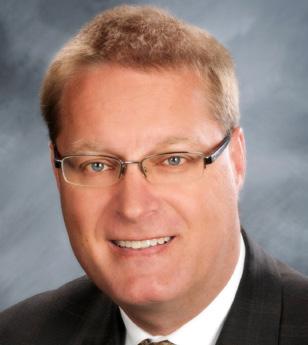






Act 975 Original Jurisdication in the Court of Appeals
By Houston Downes

Act 975 of 2025 grants the Arkansas Court of Appeals exclusive original jurisdiction over all facial challenges under the United States Constitution and Arkansas Constitution to acts passed by the General Assembly, provisions of the Arkansas Code, and administrative rules and regulations.1 This legislation has the potential to dramatically change the landscape of constitutional litigation in state court—if it stands. This change is set to take effect on November 1, 2025,2 which gives us time to consider three main questions. First, why the shift? Second, is Act 975 constitutional? And third, assuming this law will go into effect, what would that mean for a lawsuit with both a facial and an as-applied challenge?
Why?
The “why” for Act 975 depends on who you ask, but we’ll settle for the reasons offered by its sponsors: Representative Matthew Shepherd and Senator Bart Hester.
During the floor debate in the House of Representatives, Rep. Shepherd focused on fairness for Arkansas voters—Pulaski County receives an outsized number of constitutional challenges to statutes, and therefore, Pulaski County voters receive an outsized influence on who has the power to enjoin the enforcement of laws passed by the General Assembly.3 Senator Hester echoed these points during Senate floor debate, and he also stated his belief that the Court of Appeals would be less likely to have its rulings overturned by the Arkansas Supreme Court.4

Houston Downes is a litigation associate at Quattlebaum, Grooms & Tull PLLC.
Is Act 975 Constitutional?
Maybe. But the weight of the arguments seems to lean toward “no.”
Article 4, Section 2 of the Arkansas Constitution ensures the separation of powers by prohibiting the legislative, executive, and judicial “departments”5 from exercising “any power belonging to either of the others except in the instances hereinafter expressly directed or permitted.” Amendment 80 draws the line between the legislative and judicial branch—and a few provisions stick out as applicable here.
Sections 5 and 10
Amendment 80, Section 5 states that “[t]here shall be a Court of Appeals which may have divisions thereof as established by Supreme Court rule. The Court of Appeals shall have such appellate jurisdiction as the Supreme Court shall by rule determine and shall be subject to the general superintending control of the Supreme Court.”6 The term “appellate” plays a key role.
On one hand, Section 5 could be read as a constitutional requirement that the Court of Appeals have only appellate jurisdiction. After all, expressio unius est exclusio alterius, right? The expression of one term may be interpreted to exclude others. The Arkansas Supreme Court recently applied this canon of construction when it determined that Amendment 91’s specific provision
to fund “four-lane” highways meant the money could not be used for six-lane highways.7 Similarly, Amendment 80 uses the terms “appellate” and “original” with intention. Section 2 provides the Supreme Court with “[s]tatewide appellate jurisdiction,” “original jurisdiction” over various matters, and “[o]nly such other original jurisdiction as provided by this Constitution.”8 Section 6(a) establishes Circuit Courts as “the trial courts of original jurisdiction of all justiciable matters not otherwise assigned pursuant to this Constitution.”9 Section 7(a) establishes the district courts as courts of “limited jurisdiction,” and Section 7(b) provides:
The jurisdictional amount and the subject matter of civil cases that may be heard in the District Courts shall be established by Supreme Court rule. District Courts shall have original jurisdiction, concurrent with Circuit Courts, of misdemeanors, and shall also have such other criminal jurisdiction as may be provided pursuant to Section 10 of this Amendment.10
The designations of “original” and “appellate” seem carefully chosen and Section 5 is not a likely exception. Perhaps, then, the Court of Appeals has only appellate jurisdiction as a constitutional matter.
On the other hand, Section 10 states that “[t]he General Assembly shall have the power to establish jurisdiction of all courts and venue of all actions therein, unless otherwise provided in this Constitution.”11 The General Assembly’s ability to assign “jurisdiction” may be broadly interpreted to include original and appellate jurisdiction, if not otherwise allocated. And Section 5 does not explicitly prohibit the Court of Appeals from having original jurisdiction. This might open the door for Act 975 to take effect.
Nevertheless, it may be legally significant that the provision creating district courts’ original jurisdiction over criminal matters specifically invokes the General Assembly’s authority to expand it under Section 10. Such an invocation could be required when altering the original or appellate jurisdiction
of a court mentioned in Amendment 80. Otherwise, why would the drafters have mentioned it there?
Section 3
Amendment 80, Section 3, provides that “[t]he Supreme Court shall prescribe the rules of pleading, practice and procedure for all courts.”12 However, Act 975 provides that the procedure of facial challenges in the Court of Appeals “will conform to that prevailing in bench trials in circuit court.”13 It also states additional requirements related to pleadings, fees, summons, and time to file a responsive pleading.14 While Amendment 80 allows the General Assembly to amend or annul Supreme Court rules made pursuant to Section 5, 6(B), 7(B), 7(D), and 8 with a two-thirds vote of each house, it allows no similar power to alter rules made pursuant to Section 3.15 So the purely procedural rules are almost certainly unconstitutional.16 However, they may be severable from the rest of the statute, in which case, the law would survive.17
Section 3 does beg one more question, though: If the Arkansas Supreme Court is the sole source of procedural rules, can the General Assembly use Section 10 to alter jurisdiction in a way that forces the Arkansas Supreme Court to make new procedural rules? Doing so could present additional separation of powers issues under Article 4.
Constitutional Conclusion
This is certainly not an exhaustive constitutional analysis, and the outcome of a constitutional challenge is not immediately clear to me. Nevertheless, I find it compelling that Section 5 mentions only appellate jurisdiction for the Court of Appeals.
Where Do I File?
Under Act 975, if a client wants to challenge a statute with both facial and as-applied claims, it seems like the case would have to split in half, with the as-applied challenge going to circuit court and the facial challenge going to the Court of Appeals. Act 975 is silent on original jurisdiction for as-applied challenges, and Amendment 80, Section 5 only permits the Arkansas Supreme Court to make rules related to the appellate jurisdiction of the Court of Appeals. Therefore, it seems that
the Court of Appeals is left without the original jurisdiction to hear as-applied challenges, and the Arkansas Supreme Court is without authority to grant it. So where would you file constitutional challenges to Arkansas laws and regulations? Until there is more guidance, probably federal court, if possible.
Endnotes:
1. Act 975, §§ 2, 5.
2. Act 975, § 6.
3. Ark. H.R. Deb. on H.B. 1832, 95th General Assemb. (Apr. 9, 2025), https://sg001-harmony.sliq. net/00284/Harmony/en/PowerBrowser/ PowerBrowserV2/20250409/-1/31050?med iaStartTime=20250409141207.
4. Ark. S. Deb. on H.B. 1832, 95th General Assemb. (Apr. 15, 2025), https://sg001-harmony.sliq. net/00284/Harmony/en/PowerBrowser/ PowerBrowserV2/20250415/-1/31106?med iaStartTime=20250415153305.
5. Ark. Const. art. IV, § 1 divides Arkansas government into “departments” rather than “branches.”
6. Ark. Const. amend. LXXX, § 5 (emphasis added).
7. Buonauito v. Gibson, 2020 Ark. 352, at 8, 609 S.W.3d 381, 386.
8. Ark. Const. amend. LXXX, § 2(d).
9. Ark. Const. amend. LXXX, § 6(a).
10. Ark. Const. amend. LXXX, § 7(a), (b).
11. Ark. Const. amend. LXXX, § 10.
12. Ark. Const. amend. LXXX, § 3.
13. Act 975, § 2.
14. Act 975, § 2.
15. Ark. Const. amend. LXXX, § 9.
16. See Johnson v. Rockwell Automation, Inc., 2009 Ark. 241, at 6–7, 308 S.W.3d 135, 140.
17. See U.S. Term Limits, Inc. v. Hill, 316 Ark. 251, 268–69, 872 S.W.2d 349, 358 (1994), aff'd sub nom. U.S. Term Limits, Inc. v. Thornton, 514 U.S. 779 (1995) (conducting a severability analysis that considered whether an unconstitutional portion of a provision was functionally independent from the constitutional portions and whether the provision would have been enacted without the unconstitutional portion). ■
One Word, Big Impact: Strengthening UPL Enforcement Through Act 110
By Meagan Davis

In the legal world, a single word can change everything. That truth is on full display in Act 110 of 2025, which amended Arkansas Code Annotated § 16-22-501(a), the state’s central statute concerning the unauthorized practice of law (UPL). The change—seemingly minor—swaps the phrase “intent to obtain a direct economic benefit” with “intent to obtain any economic benefit.” This shift strengthens the state’s ability to protect Arkansans from the harm caused by unlicensed legal practice.
The unauthorized practice of law remains a significant concern throughout Arkansas, as vulnerable individuals across the state seek help following accidents or personal injury. Prior challenges in enforcing the statute revealed a loophole created by the original “direct economic benefit” language, which limited the ability of prosecutors and courts to hold certain unlicensed practitioners accountable. Act 110 addresses this issue with a targeted amendment that enhances public protection.
The UPL Committee receives numerous complaints annually regarding various suspected forms of unauthorized practice. It is important to note that this code section is limited to those acts that constitute a criminal unauthorized practice of law. When a complaint comes to the committee implicating a violation of this code section, “[t]he Committee may also refer cases to the appropriate prosecutor, the United States Attorney, the Attorney General of the State of Arkansas, or other appropriate authorities for investigation and possible prosecution or action.”1
The Problem: “Direct” Economic Benefit Created a Loophole

Meagan Davis is a partner at Maddox & Davis PLLC and a member of the Arkansas Supreme Court Committee on the Unauthorized Practice of Law
Before the amendment, Arkansas law required proof that an unlicensed individual acted “with intent to obtain a direct economic benefit” to be charged with unauthorized practice. The qualifier “direct” created confusion and limited enforcement in several cases. Questions arose about whether an economic benefit had to come immediately and directly or if indirect compensation—such as payment routed through a third party—was sufficient to trigger liability.
This ambiguity became apparent in a recent Sebastian County case. Daniel Shue, Prosecuting Attorney for the county, testified before the Senate Judiciary Committee about the proposed legislation. He explained that two individuals were operating as “runners” for chiropractors by soliciting accident victims and providing legal advice regarding settlement timing and waiver signing. These actions clearly constituted the unauthorized practice of law. However, because these individuals received payment indirectly from the chiropractor rather than directly from insurance proceeds, the judge questioned whether the existing statute applied. While the individuals were charged and convicted, the case exposed a potential problem in the law’s language.
Rep. Jay Richardson, one of the bill’s house sponsors, provided similar testimony before the House Judiciary Committee, highlighting the need for legislative action to clarify and strengthen the statute. He stated this change was needed to help prevent similar issues in the future.
From the perspective of the UPL Committee, lawyers whose clients engage in activities that previously fell within these statutory gray areas should read the new law carefully and counsel their clients accordingly. The statutory revision enacted by Act 110 expands the range of conduct that may constitute criminal unauthorized practice, thereby broadening the circumstances under which the committee may refer matters to an appropriate law enforcement entity for further investigation and/or enforcement.
The Legislative Response: Expanding Protection for the Public
Act 110’s key amendment replaces “direct economic benefit” with “any economic benefit,” eliminating the ambiguity that previously hindered enforcement. This change ensures that individuals cannot avoid liability simply because their economic gain comes indirectly, through intermediaries, or via complex business arrangements.
Representative John Maddox, another of the bill’s house sponsors, described the amendment’s purpose succinctly:
This amendment isn’t about expanding the law—it’s about closing a loophole. We want to make sure people who are exploiting Arkansans with unlicensed legal services can be held accountable, no matter how they try to profit.
By preserving the requirement of intent, the change continues to distinguish between unlicensed practitioners seeking financial gain and well-meaning individuals providing informal advice. However, it removes the narrow limitation that previously left victims unprotected in cases involving indirect compensation. As stated by Shue before Committee, “This is not really for lawyers; this bill is to protect the public.”
Why This Matters: Protecting Vulnerable Arkansans
Unauthorized legal practice disproportionately harms vulnerable populations, often those recovering from personal injury or navigating complex

insurance claims. Because they are unlicensed, these individuals lack the necessary training, ethical standards, and accountability, putting those they advise at risk of misinformation, exploitation, and financial harm.
The statute prohibiting unauthorized practice of law exists primarily to protect the public. Act 110 enhances this protection by closing a loophole that previously allowed some unlicensed individuals to evade liability due to the technicality of “direct” economic benefit. This amendment empowers prosecutors and courts to more effectively safeguard Arkansans from deceptive and harmful practices.
Effective Date of Act 110
Act 110 was signed into law on February 18, 2025. Since it does not carry an emergency clause or specify a different effective date, it is set to take effect 90 days after the conclusion of the legislative session. The Arkansas General Assembly adjourned sine die on May 5, 2025, which means the law took effect on August 5, 2025.
Conclusion: One Word Can Make All the Difference
The change from “direct” to “any” economic benefit in Act 110 may seem small, but its impact on protecting Arkansans is significant. It closes a gap that frustrated prosecutors, hindered effective enforcement, and left vulnerable clients exposed.
This change will also necessarily alter the legal advice given to clients who financially benefit as a result of the now-closed loophole, effective August 5, 2025.
Thanks to the leadership of the Arkansas General Assembly, the law now better serves its fundamental purpose: ensuring that those who provide legal advice or representation do so within the bounds of licensing and ethical regulation.
Sometimes protecting the public requires a major policy overhaul; other times, it only takes changing one word.
Endnote: 1. Rules of Court Creating Committee on the Unauthorized Practice of Law, (12)(D). ■



Converting Damages to Reimbursement: Act 28’s Insult to Injury Law
By Brian G. Brooks


EBrian G. Brooks is a solo practitioner who focuses on appellate practice and complex legal research, writing, and advocacy for the plaintiff’s bar.
nvision this: Pat’s car is damaged when Don rear ends it. Pat can recover, among other things, the value of the replacement of the dented bumper. But let’s say Pat happens to be good at repairing such things on her own and can replace the bumper for a fraction of the out-of-pocket cost that Joe’s Paint and Body Shop would charge to do it. Does Don get the benefit of Pat’s thrift and resourcefulness so that all Don has to pay is what it cost Pat to replace the bumper, which is nothing? Of course not. Don still must pay as damages the value of the replacement of the bumper even though Pat did the replacing. That is so because tort law imposes an obligation to pay the value of the harm caused not an amount necessary to reimburse out-of-pocket expenses. 1 That is not “new” law or even recent law. It has been the law for time immemorial. Wrongdoers pay for the value of the harm they cause, not a reimbursement amount influenced by the thrift or resourcefulness of the person they happened to injure.
Act 28 of 2025 turns this concept on its head for reasonable and necessary medical expenses incurred in the past for treatment of injuries caused by someone else’s wrongdoing. It effectively makes tortfeasors, those who injure others by negligence or intentional bad conduct, thirdparty beneficiaries of contracts between the health insurers of injured victims when they were never meant to be. And it does so by converting the measure of damages to the cost of reimbursement instead of the value of the harm caused. The result is the injured person, Pat in our dentedbumper hypothetical, is victimized twice; once when the injury happens then again when damages are measured. What’s more, only the most responsible and resourceful injured persons suffer this outcome. Those who don’t bother to purchase insurance or who cannot somehow reduce their out-of-pocket cost are actually entitled under Act 28 to recover more. This result is as nonsensical as it sounds.
Act 28 is not complicated. It amends a prior statute allowing recovery
of damages in personal injury cases. Arkansas Code Annotated § 16-64120 allows that “whenever damages are recoverable, the plaintiff may claim and recover any rate of damages to which he or she may be entitled for the cause of action established.” 2 Act 28 added the following language to that statute in a new subsection (b):
Recovery of damages under subsection (a) of this section for past necessary medical care, past necessary medical treatment, or past necessary medical services received includes only those costs actually paid by or on behalf of the plaintiff or that remain unpaid and for which the plaintiff or any third party is legally responsible. 3
This language defines what is recoverable by an injured person not by the value of the services rendered but by the amount of money the provider might accept as payment influenced by prior contracts, government payment scales, or charity. In other words, actual damage is ignored and cost reimbursement is the standard. But that historically is not the measure of the injury inflicted by the bad acts of a wrongdoer. The law historically looked to the value of the harm caused not the cost of reimbursement and for good reason. Hold that thought. We will get back to it.
Act 28’s proponents make a facially appealing argument that ultimately is wrong and misleading. They contend that all an injured person should ever be entitled to recover as past medical expenses is what the injured person paid, or what was paid on her behalf, to reimburse her for fixing the injury. The value of the efforts to repair the wrong is to them irrelevant. What the injured person paid to fix it is all that matters. The Act is a bad idea that hopefully will not live long. Like all so-called “tort reform” measures, the “reform” it brings is a euphemism for some act that makes it harder for those injured by the wrongs of others to recover what they lost. Why do we never “reform” the tort system in ways that make it easier for victims
to recover and are more likely to hold wrongdoers accountable? That logic is counterintuitive. We should be stressing accountability and recovery, which is what the tort system is meant to foster, 4 not shielding wrongdoers from liability. I digress. I will resist lapsing into a discussion of how “tort reform” always targets the injured person and benefits the wrongdoer and stick to the topic at hand.
1. Some limitations.
The reach, accrual date, and ultimate validity of Act 28 are barely touched on here. Challenges to all that will undoubtedly follow, as will prickly issues of how evidentiary rules will be conformed to meet the substantive elements of the statute. Suffice it to say that initial challenges to Act 28’s effective date will focus on established “vested rights” jurisprudence and will turn on whether an injured person had a vested right to the pre-Act-28 measure of damages. 5 The Act’s validity will not turn on Amendment 80 § 3 of the Arkansas Constitution as many anticipate. Rather, the argument will focus on Article 5, § 32. Those are issues for another forum and another day. The effort here is to explain why Act 28 is so wrong and is such a bad idea.
2. A truly bad idea made into law.
Historically, we measured what could be recovered for medical services the same way we measure what can be recovered for replacing our hypothetical dented bumper: by the value of what it takes to repair or treat the injury. 6 So, if Paul riding his bicycle was hit by Dennis negligently driving a car and suffered a broken leg, Dennis had to pay to Paul the value of the medical services Paul had to undergo to fix the broken leg. If Paul happened to have an uncle who could set the leg for free, or insurance that through contracts negotiated with medical providers was able to reduce the cost of the services, that did not matter. Paul had the right to recover the value of the services, not the cost, because the value is the damage the defendant’s negligence caused.
The law recognized that wrongdoers
should not benefit from the foresight of the plaintiff who obtains insurance coverage, the assistance of government benefits, or the gift given by charity or kinship. Therefore, when an injured plaintiff’s medical bills were paid by an insurer, by a government program, or by charity, or where those medical costs were absorbed in whole or in part by the provider as a matter of contract, as a gift or simply because the plaintiff could not pay them, evidence of, or the result of, those payments or writeoffs was inadmissible or irrelevant in a case assessing the wrongdoer’s liability. 7 Substantively, the law differentiated between the injured person’s need to recover (the amount it would take to reimburse the injured person) and the injured person’s right to recover the value of the harm done (the actual damage inflicted). 8 The law wished to impose upon the wrongdoer the obligation to pay for the value of “all harm he causes, not confined to the net loss that the injured party receives.” 9
A quirk of modern medical billing practices created an avenue for “tort reformers” to undercut this long-existing law. The medical insurance carriers for injured persons who had the ability and foresight to purchase health coverage began to negotiate rates with preferred medical providers to discount the amounts the providers would accept for services. In other words, if an emergency room would ordinarily bill $500 to set a broken leg, the emergency room would accept as full payment for those insured by a particular health insurance company $300 under a contract between the health insurer and the ER. This concept is known as the negotiated rate differential.10 It is the result of a contract between health insurers and medical providers for the benefit of injured persons with whom the health insurer has separate contracts. It has nothing to do with the actual value of the services. Indeed, if the injured person does not have the benefit of the insurance carrier’s contract, the cost of the very same services is the undiscounted amount. Our hypothetical ER would charge that person $500 not $300.
Yet, Act 28 gives the wrongdoer

the benefit of the contract the injured person’s health insurer negotiated with the medical provider. That treats the wrongdoer as a third-party beneficiary of a contract never intended to benefit him and harms the very person the contract was meant to benefit, the injured person, by reducing the amount the injured person can recover. In other words, if we act responsibly and purchase health insurance, we buy a benefit for the person whose wrongful conduct injures us. That would seem to be the very definition of a bad idea.
Adding insult to injury, Act 28 makes no provision for the cost to the injured person of the premium she paid to purchase the health insurance that ends up benefitting the person who hurt her. Health insurance isn’t cheap. And our injured person would not have the benefit of the negotiated rate differential if she hadn’t bought health insurance. Therefore, the wrongdoer not only obtains the benefit of the contract negotiated for the benefit of the person he harmed, he gets the benefit of the premium the person he
harmed paid. Once again, this seems to be the very definition of a bad idea.
Concluding thoughts
Act 28 has a surface appeal that makes it deceptively attractive. How could anyone oppose a law that simply allowed an injured person to recover what it cost him to treat an injury? That deceptive surface appeal ignores the value of the harm done and the full measure of cost to the injured person. And what do we say to the veteran whose military service entitles him to medical coverage that eliminates his ability to recover the value of the harm done to him by another? What do we say to that same veteran when another person suffering the same injury who never served and did not pay for health insurance is able to recover the full measure of the value of the medical services rendered? For now, we say that is the result of Act 28 of 2025.
Endnotes:
1. Restatement (Second) of Torts § 920A, cmt. b; F. Harper et. al., The Law of Torts 25.22, p. 651 (2d Ed. 986).
2. Ark. Code Ann. § 16-64-120(a).
3. 2025 Acts of Ark. No. 28.
4. Fye v. Kennedy , 991 S.W.2d 754, 764 (Tenn. Ct. App. 1998).
5. See e.g., English v. Robbins , 2014 Ark. 511, 452 S.W.3d 566; Cauffiel v. Progressive Eldercare Services-Saline, Inc., 2021 Ark. App. 314, 635 S.W.3d 1.
6. 25 C.J.S. Damages § 158 (“The proper measure of damages for medical treatment rendered in a personal injury action is the reasonable value of the medical treatment reasonably required by the injury and not the amount actually paid or charged.”).
7. See Montgomery Ward & Co. v. Anderson , 334 Ark. 561, 976 S.W.2d 382 (1998); Bell v. Estate of Bell , 318 Ark. 483, 885 S.W.2d 877 (1994); Green Forest Public Schools v. Herrington , 278 Ark. 43, 696 S.W.2d 714 (1985); Patton v. Williams , 284 Ark. 187, 680 S.W.2d 707 (1984); Amos, Adminstratrix v. Stroud & Salmon , 252 Ark. 1100, 482 S.W.2d 592 (1972); Pekin Stave & Mfg. Co. v. Ramey , 104 Ark. 1, 147 S.W. 83 (1912).
8. O’Bryan v. Hedgespeth , 892 S.W.2d 571, 576 (Ky. 1995).
9. Montgomery Ward & Co. , 334 Ark. at 566–67, 976 S.W.2d 382 (1998) (quoting Restatement (Second) of Torts § 920A, cmt. b). See also Bell , 318 Ark. at 490, 885 S.W.2d 877 (quoting F. Harper et. al., The Law of Torts 25.22, p. 651 (2d ed. 1986)).
10. See Christopher W. Blaylock, The Vital Role of the Collateral Source Rule in United States Healthcare Financing , 36 U. LA Verne L. Rev. 1 (2014). ■

Unraveling the Facts. Delivering the Truth. What We Offer
Expert Testimony: Unbiased, clear, and professional expert testimony in court to support your legal cases
Forensic Investigations: Comprehensive analysis of accidents, mechanical failures, product defects, and more.
Detailed Reports: Thorough and scientifically backed reports that stand up to legal scrutiny
Consultation Services: Collaborate with attorneys to develop a sound legal strategy with solid engineering expertise.
Why Choose Us?
Years of Experience: Our team of forensic engineers brings years of hands-on experience in the field.
Credibility in Court: Trusted by top law firms for delivering concise, accurate, and compelling testimony that juries and judges can understand
Timely & Professional Service: We work diligently to meet your deadlines while maintaining the highest quality standards
Expert Witness Testimony
Mechanical Equipment Failures
VAR- Accident Reconstruction
Agriculture Accidents and Equipment
HVAC Fires & Product Liability
Act 28 Marks a Major Change in Claim Value
By Haley Heath Chaney

The Arkansas General Assembly’s 2025 session was a busy one. Of the many changes in law that came out of the session, one deserves particular attention from civil trial lawyers on both sides of the bar. The passage of Act 28 marks a significant change in compensability of medical bills paid by a collateral source. This will reduce the value of claims and verdicts in many cases involving large medical bills.
I. What Does Act 28 Do?
With the passage of 2025 Arkansas Act 28, plaintiffs in civil cases can now recover only the medical bills paid by them or on their behalf. They cannot recover medical bills charged but reduced by providers through a negotiated setoff or other form of bill reduction.

Haley Heath Chaney is a partner in the Little Rock office of Gordon Rees Scully Mansukhani, with a general civil defense practice, and a member of the Arkansas Association of Defense Counsel.
This marks a significant change in the law. Prior to this change, juries could award plaintiffs the costs of incurred medical bills, including those never paid by plaintiffs or their insurers. The practical result of this change is that the monetary value of cases involving large amounts of medical bills is reduced across the board, except in cases involving uninsured plaintiffs.
By way of example, assume Jane underwent a botched spinal surgery. As a direct result of the errors in her surgery, she requires one million dollars in post-operative rehabilitation and respite care.
Prior to the 2025 legislative session, this one-million-dollar medical bill would have been compensable, regardless of what portion of the bill was ultimately paid. The one-million-dollar bill would be presented to a jury in a request for damages and was often one of the lower-hanging fruits in a damage award.
Under the new law, the portion of the medical bill that is compensable is the portion that is actually paid by Jane or on Jane’s behalf.
Assume Jane is a wealthy 58-year-old who is uninsured and opts to pay for healthcare services directly. She pays her entire medical bill out of pocket in the amount of one million dollars. The entire bill remains recoverable under the new law.
Now assume Jane is a 65-year-old on Medicare. Medicare contracts with medical providers who agree to accept a Medicareapproved amount from Medicare in full compensation for a medical bill. Assume the Medicare-approved amount is 25% less than the charged amount and Medicare pays $750,000. Jane’s provider accepts the Medicare rate as payment in full for the services provided to her. In this scenario, only the $750,000 is recoverable, whereas the full charge would have been recoverable under the earlier version of the law.
And, Medicaid-approved rates are lower than Medicare rates. This means if Jane is on Medicaid (which is for low-income individuals and families), rather than Medicare (which is primarily for those 65 and older), her as-paid medical bill will be lower than Joe, if Joe has the same treatment covered by Medicare. And both Jane and Joe’s as-paid medical bill will be lower than a patient whose care is covered by private insurance. Reports suggest that private insurance pays nearly double what Medicare pays for the same services.1
The new law allows for recovery only of the actually-paid amount of the medical bill, not the original medical bill prior to the application of setoffs of negotiated rates between providers and insurers.
This means the value of a plaintiff’s claim for the exact same medical services rendered varies under the new law. An uninsured plaintiff, a plaintiff covered by Medicare, a plaintiff covered by Medicaid, and a plaintiff covered by private insurance are each entitled to different recoveries from a jury for the same injuries and same treatment received.
The value of Jane’s claim to the attorneys working on her case and to the defense attorneys evaluating settlement depends on what setoffs a medical provider applies to Jane’s medical bills.
II. Legislative History of the Act
The bill was advanced by Representative Jon Eubanks and Senator Missy Irvin. Senator Irvin testified in a senate floor session that the bill was designed to alter the common law created in existing Arkansas Supreme Court cases. She stated that “we know rates are negotiated and contracts are signed . . . that’s how third-party payors
function in the real world.”2 She went on to state “it is unreasonable then to ignore this reality” when determining compensation for damages in court. She stated the prior law awarded damages and claims that never actually existed in reality and were never paid.
Representative Eubanks stated in public comment that he viewed the change as good for the state as a whole.3 He also stated he does not want to deprive an injured party a just recovery for damages. But he argued what is accepted as full and final payment should be the amount that the plaintiff receives.4 He noted currently Arkansas courts allow the plaintiff to recover the billed amount even though something less was accepted, and he stated that approach does not make sense to him.5
Senator Irvin identified the Arkansas Supreme Court cases Dale v. White6 and Montgomery Ward & Company v. Anderson7 as examples of the unfairness she wanted to correct with the Act. The Montgomery Ward case specifically addressed the question of recoverability following “forgiveness of a debt for medical services.”8 In the case, the Supreme Court ruled forgiven debt was protected by the collateral source rule, noting the court’s “policy of allowing the innocent plaintiff, instead of the tortfeasor defendant, to receive any windfall associated with the cause of action.”9
III. Act 28 Is a Fair Compromise and Good Public Policy
In the halls of the legislature during public comment on Act 28, much was heard about fairness. How is Act 28 fair?
When considering the purpose of compensatory damages, the Act makes sense. “Compensatory damages are awarded to make the injured party as nearly as possible ‘whole.’”10
When Jane’s insurer negotiates a reduced rate of compensation to pay Jane’s medical bills, awarding Jane a recovery for the entire medical bill, as billed, rather than as paid, does not compensate Jane for her injuries. Rather, it works to create a windfall to her.
When there is an insurance or Medicare or Medicaid setoff for a plaintiff’s medical bills, no one, including the plaintiff or her insurer, pays the setoff amount. Therefore, no party is entitled to compensation for that
amount as no party has paid that amount.
In considering Jane from the above section, what is needed to make her whole? Damages for her pain and suffering, of course. Damages for permanent injury and loss of quality of life. Damages for lost wages. And medical bills paid on her behalf.
But awarding Jane a payment for bills not paid for by her or on her behalf, which were instead setoff pursuant to a hospital’s payment arrangements with insurance companies, does not work to make Jane whole. Rather, such an award serves to make Jane a profit above what she is awarded for her incurred damages.
Why should a plaintiff be awarded a windfall?
The purpose of a compensatory award is not to force a tortfeasor to provide a windfall to a plaintiff. In cases involving a bad actor rather than a merely negligent one, a plaintiff can seek punitive damages against that tortfeasor, which may serve as punishment and deterrence.11 However, a medical bill award is not the proper place to inflict a penalty on a tortfeasor. There are multiple other categories of compensable damages for which a tortfeasor remains liable. Act 28 impacts only the compensability of incurred (but not paid) medical bills.
Opponents of Act 28 argued at the time that the Act allows tortfeasors to benefit from the insurance premiums paid by injured parties, the theory being that a party purchasing insurance should benefit from the agreements for payment that her insurance provider has reached with medical providers.
In reality, the Act does nothing to interfere with the benefit of the bargain Jane reached with her insurance company in obtaining and paying for a medical insurance policy. Jane pays her medical insurance company premiums. In exchange, it pays her medical bills on the approved schedules the insurer has negotiated with providers.
That Jane cannot recover bills not paid by her providers does not reduce the benefit Jane receives from her insurance company. The two concepts are wholly unrelated. A purchaser of insurance does not purchase the right to a windfall if injured by tort. In fact, payors like Medicare and Medicaid
often place liens on judgments to recoup the amount of money spent on medical bills when their insureds obtain a judgment covering those paid bills.12 Further, in cases involving medical bills covered by Medicare and Medicaid, the argument that a tortfeasor benefits from a plaintiff’s premiums is not always applicable.
Representative Matt Brown of Conway offered this analogy. A shirt’s price tag states it costs $100. Eventually, the price is reduced to $40. A purchaser who purchases the shirt for $40 and then returns it cannot expect to be given $100 upon the shirt’s return.13 In the same way, a plaintiff who never paid the full price tag of medical bills (and whose full price was not paid on her behalf) should not then expect to recover the full price from a jury award. The price was reduced in reality, and the jury award should reflect the reality of the actual damage.
The Act also serves a public function. According to the U.S. Chamber of Commerce, costs of civil cases reached $529 billion in 2022, representing 2.1% of the U.S. GDP and $4,207 per American household.14 The rising costs of civil litigation result in higher insurance premiums for all payors and, in some cases, result in whole industries facing difficulty in obtaining insurance of any kind.15
Under the old law, the insured plaintiff benefits from a windfall by being able to recover for offset charges actually paid by no one, and the rest of society suffers in higher insurance premiums or in businesses who become uninsured, unable to compensate the next injured party in any way.
Under Act 28, the individual plaintiff is made whole for her medical bills paid by her or on her behalf, either by her insurance provider, her governmental benefits, or by the tortfeasor. She can no longer recover for the medical bills charged but not actually paid by any entity on her behalf. Jane simply does not get a windfall. And, the insurance companies paying many of the civil judgments pay lower judgments across the board, helping with stability of premiums and continued insurability.
Representative Eubanks specifically argued that the old law increased costs across the board and that a reduction in costs helps businesses across the board. He opined that manufacturers are leaving
the country due to the costs of liability litigation. And, he stated he believed we should take steps to reduce the costs of doing business in the state.
Representative Shad Pearce, in advocating for the Act, acknowledged there are multiple factors involved in the escalating costs of insurance and that the Act is not a panacea to fix all of those issues. However, he noted the Act makes sense and could potentially reduce the costs of insurance across the board. He advocated that the General Assembly should not throw up its hands and refuse to act at all on the basis that it cannot solve the entire problem of insurance costs.
IV. Will Act 28 Survive a Rockwell-Type Challenge?
In the past, many of the General Assembly’s efforts at tort reform have been stricken by the Arkansas Supreme Court as an improper reach into the court’s dominion over court procedure.16 To avoid this, the drafters of Act 28 were careful to focus on substantive rather than procedural law.
The evidentiary rule at issue is the collateral source rule. That rule states “[a] trial court must ‘exclude evidence of payments received by an injured party from sources “collateral” to . . . the wrongdoer, such as private insurance or government benefits. . . .’”17
Act 28 is not the first attempt to do away with the collateral source rule. The General Assembly attempted to eradicate the collateral source rule as part of the Civil Justice Reform Act of 2003. That act contained a statute, Ark. Code Ann. § 1655-212, which stated:
Any evidence of damages for the costs of any necessary medical care, treatment, or services received shall include only those costs actually paid by or on behalf of the plaintiff or which remain unpaid and for which the plaintiff or any third party shall be legally responsible.
The Arkansas Supreme Court declared this statute unconstitutional in 2009 in Johnson v. Rockwell Automation, Inc.18
The court reasoned that rules of evidence are rules of pleading, practice, and procedure, which fall under the Supreme
Court’s domain.19 Because section 212 limited what evidence could be introduced at trial, it was a rule of procedure, not a rule of substance. As such, the Supreme Court declared that the statute violated the separation of powers set forth in article 4 section 2 and amendment 80 of the Arkansas Constitution and was unconstitutional.
Act 28 is different. It does not seek to restrict what evidence is admissible at trial. Conceivably, a circuit court could still allow insured medical bills to be introduced if admissible and relevant under some rule of evidence.
Instead, Act 28 speaks to what element of damages are compensable as a matter of law. This is a purely substantive act. It addresses the policy question of who should benefit from medical payments, as is the legislature’s role. It does not address the procedural question of what evidence is admissible in a court. For that reason, the Act is likely to survive a challenge based on the separation of powers.
V. Is Act 28 Retroactive?
Act 28 became law on August 5, 2025, 90 days after the General Assembly adjourned sine die and will apply to all lawsuits filed after that date.
Whether Act 28 will apply to lawsuits that were pending prior to August 5, 2025, is unknown. Act 28 does not include an emergency clause or any written indication that it is to be applied retroactively.
In determining whether to apply a law retroactively, the courts analyze whether the law takes away a vested right.20 If the law takes away a vested right, it cannot be applied retroactively.21 When a law is remedial in nature, it may be applied retroactively.22 “The rule by which statutes are construed to operate prospectively does not ordinarily apply to procedural or remedial legislation.23
The questions of whether Act 28 is remedial in nature or whether the Act interferes with vested rights will most certainly be litigated at length in the coming months. There are strong arguments to be made on each side. A ruling from the appellate court will likely be necessary on the issue. Until then, practitioners will likely devote many brief pages to advancing the issue on both sides.
VI. What to Expect Moving Forward
It will be interesting to see whether the new law will change how plaintiffs pay for medical bills. It will also be interesting to see how courts approach care provided by a charitable hospital at no cost or later forgiven. Representative Matthew Shepherd opined from the House floor that when a hospital forgives the costs of services but sends a 1099 to the recipient, making the care received taxable income, that forgiven debt will still be recoverable under the new law. Representative Shepherd also stated that bills that remain owed at the time of trial should be recoverable.
In cases where liability is established, an insured plaintiff may opt for services provided by practitioners be paid by a lien on a judgment, rather than submitting those bills to insurance. If this practice increases, the ultimate outcome of the Act may be different from the intended purposes of reducing the costs of litigation.
Another issue to watch out for is that if the Act survives a Rockwell-type challenge, the legislature may look to further modify the law to exclude medical bills paid by an insurer from recovery.
Conclusion
Act 28 marks a significant change in the law, particularly in cases involving large medical bills, including vehicle accidents with catastrophic injuries, medical malpractice cases, and even run-of-the-mill premises cases with slip and falls requiring surgeries. Given the applicability of the change across the board, personal injury attorneys on both sides of the bar should take efforts to understand the law and explain it to their clients.
Endnotes:
1. Eric Lopez, et. al, How Much More than Medicare do Private Insurers Pay?, KFF (Apr. 15, 2020), https://www.kff.org/medicare/ issue-brief/how-much-more-than-medicaredo-private-insurers-pay-a-review-of-theliterature/.
2. Senate Floor Session, February 6, 2025.
3. House Judiciary Committee Meeting, January 28, 2025.
4. Id.
5. Id.
6. 2018 Ark. App. 172.

At Public Notice Agency, we have one important mission: place all legal notices for firms like yours, saving you money and time while ensuring accuracy.
Our team uses innovative technology to place your notices in qualified newspapers. We confirm scheduled publication, manage accounting, and provide you with proofs along with one invoice.
INTERESTED? EMAIL US! INFO@PUBLICNOTICEAGENCY.COM OR BY PHONE (501) 823-9002
7. 334 Ark. 561 (1998).
8. Id. at 564.
9. Id. at 567.
10. John Wesley Hall, Trial Handbook for Arkansas Lawyers § 99:4 (Thomson Reuters (2018).
11. Ark. Code Ann. § 16-55-206.
12. See generally 42 U.S.C. § 1395y(b)(2) (B)(ii).
13. Justin Allen, Justin Allen: For HB 1204, Talk Business and Politics, Feb. 2, 2025, https://talkbusiness.net/2025/02/justinallen-for-hb-1204/.
14. Lawsuit Costs Are Escalating, and U.S. Househoulds are Paying the Price, U.S. Chamber of Commerce (Dec. 2024), https://www.uschamber.com/lawsuits/ lawsuit-costs-are-escalating-and-u-shouseholds-are-paying-the-price.
15. The Legal Advancements Hitting Insurers (and Americans) Where It Hurts, Insurance Business (Apr. 2024), https:// www.insurancebusinessmag.com/us/news/ legal-insights/the-legal-advancementshitting-insurers-and-americans-where-ithurts-484027.aspx.
16. See, e.g., Johnson v. Rockwell Automation,
Inc., 2009 Ark. 241, 308 S.W.3d 135; Summerville v. Thrower, 369 Ark. 231, 253 S.W.3d 415 (2007).
17. Montgomery Ward & Co, Inc. v. Anderson, 334 Ark. 561, 563, 976 S.W.2d 382, 385 (1998), quoting Bell v. Estate of Bell, 318 Ark. 483, 490, 885 S.W.2d 877, 880 (1994).
18. 2009 Ark. 241.
19. Johnson v. Rockwell Automation, Inc., 2009 Ark. 241, at *10, 308 S.W.3d 135, 142.
20. Forrest City Machinery Works, Inc. v. Aderhold, 616 S.W.3d 720, 725 (1981).
21. Id.
22. Id.
23. Id. ■
Adoption of Market-Based Sourcing in Arkansas Highlights Tax Risks for Firms in Other States
By Matt Boch

The most important tax legislation from the 2025 Arkansas legislative session was changing the way the state income tax applies to multistate businesses that provide services—including legal services—by adopting market-based sourcing. The bottom-line effect on your own taxes will be limited if you are an in-state resident business owner. But other states have similar approaches, and the tax risks from working across state lines are increasing for legal and other professional services.
Market-Based Sourcing Imposes State Tax Based on Where Benefits Are Received

Matt
Boch
is
a Transition Partner with Kutak Rock LLP. He is a former Chief Commissioner of the Arkansas Tax Appeals Commission and a former Chair of the Arkansas Bar Association Section of Taxation.
First, some income tax basics: Most states impose an income tax, and they generally tax multistate businesses using formulary apportionment. Instead of trying to track profit and loss within the state by separate accounting, a state takes the total income of a business and then apportions a share to tax according to its choice of formula. Two generations ago, that formula was almost always one-third payroll, one-third property, and one-third sales. States since then have changed their apportionment formulas to be more competitive, by shifting the tax burden toward the privilege of selling into the state instead of penalizing job creation and investment.
Arkansas has been a laggard, with most1 of its apportionment reforms coming in the past decade: The state adopted apportionment for tax partnerships beginning in 2018, instead of requiring separate accounting.2 Then Arkansas adopted single sales factor apportionment3 upon recommendation by the Tax Reform and Relief Legislative Task Force.4 By eliminating the property and payroll factors, Arkansas income tax was apportioned based only on the sales factor beginning in 2021. The next step was repealing the throwback rule— which turns the sales factor for sellers of goods into a backdoor tax on jobs and investment—under a phase-out resulting in complete repeal by 2030.5
While these reforms have improved competitiveness, they left the sales factor
rules for services and intangibles in the old status quo, sourcing based on costs of performance.6 The costs of performance of services tend to be where labor and property are located, effectively penalizing job creation and investment. In the old economy of inperson services, that approach made sense, but the contemporary economy involves remote sales of services through the internet and other communications technology. Maintaining costs of performance rules in this environment made Arkansas less competitive for service centers, data centers, and other service businesses, and it allowed out-of-state service businesses to sell into the Arkansas market while paying no or minimal income tax.
Act 719 of 2025 begins fixing this problem, putting Arkansas on market-based sourcing for tax years beginning in 2026 or later. If a business is taxable in multiple states, it generally will calculate the Arkansas sales factor by sourcing sales based on where the services are received instead of where they are performed. So, for example, a firm deciding between hiring a paralegal in its offices in Texas or Arkansas would face no income tax apportionment penalty for hiring in Arkansas.
The direct impact of Arkansas marketbased sourcing on a resident law firm owner is limited: Almost all law firms are set up as passthrough entities, and an Arkansas resident is taxed on worldwide income, and with a credit for taxes paid to other states. For an individual resident owner, tax at 3.9% of worldwide income applies regardless of how the passthrough business sources its income. Nonresident partners, on the other hand, may see a benefit if work is being performed in Arkansas for an out-of-state market. The long-term impact of Act 719 should be improved growth and slightly increased tax revenue for the state—which in all likelihood will help pay for additional cuts to the Arkansas income tax.
Of course, there are additional layers of tax complexity. Sales to states where a business is not taxable will be ignored under a “throwout rule,”7 which could be repealed to maximize the competitiveness benefits of market-based sourcing and to avoid malapportionment. Some firms may have obtained permission from the Department of Finance and Administration to use separate
accounting instead of apportionment.8 And the passthrough entity tax regime that was enacted in 2021 can complicate things further, although it typically is beneficial for Arkansas business owners.
Firms Practicing Across State Lines Face Tax Risks
It is not just Arkansas that has gone to market-based sourcing. Most states have done so already, although our neighbors in Texas and Mississippi have not. The result of most states going to market-based sourcing of services is a more difficult compliance landscape for small- and midsized businesses like many law firms. Legal practice often involves travel to appear in court, take depositions, or meet with clients. Such activity, depending on the facts and applicable state rules, may be sufficient to establish nexus. Even fully remote services can trigger economic nexus with a sufficient volume of sales under many state rules— perhaps a $250,000 or $500,000 annual threshold.
Increasing data and systems capabilities on the part of state revenue agencies should be expected to increase state audit activity. And legal practice—particularly appearances before courts or other tribunals—creates a trail of data for state auditors to identify outof-state businesses. Once on audit, invoices and time entries provide ample information for a state tax auditor.9
Market-based sourcing as applied to legal practice has thorny issues given the fluid nature of the work.10 What is the market if you are conducting a deposition in Kansas on behalf of a client in Missouri in connection with litigation before a federal court in Oklahoma?11 State rules vary on sourcing; the most common approach is derived from the Multistate Tax Commission’s model rules for professional services,12 which generally source based on residence for individual clients and on the place of principal management—the office or headquarters—for business clients. Typically, these will be the billing addresses, and market-based sourcing tends to that approach as a practical matter, but state rules may require a nuanced analysis. Firms with tax obligations in multiple states face difficult practical questions about determining what information to track and identifying appropriate sourcing positions.
Conclusion
As law firms scale and work across jurisdictions, their tax complexity and state tax risks grow. Market-based sourcing is just a part of the compliance puzzle. Arkansas’s new law will require the owners of many out-of-state firms selling into Arkansas to pay income tax, but the mirror image of that is that Arkansas-based law firms have been facing similar risks in other states, and those risks are increasing.
Endnotes:
1. Arkansas did double-weight its sales factor 30 years ago. Act 682 of 1995.
2. Act 482 of 2017, § 1 (amending Ark. Code Ann. § 26-51-802).
3. For a discussion of single sales factor apportionment, see Moorman Mfg. Co. v. Blair, 437 U.S. 267 (1978) (declining to invalidate Iowa single sales factor apportionment under the record before the Court).
4. Act 822 of 2019, § 7.
5. Act 485 of 2023, § 3.
6. See Ark. Code Ann. § 26-51-717, as in effect for tax years beginning before 2026.
7. See Ark. Code Ann. § 26-51-717(c), as amended by Act 719.
8. See Ark. Code Ann. § 26-51-802(c)(3) (A).
9. Tax audits also can create confidentiality issues for law firms. See Boch and Lawrence, Lawyers Face Confidentiality Ethics Risks in Their Own State Tax Compliance, 26 Journal of Multistate Taxation and Incentives No. 6, at 40 (Sept. 2016).
10. For a detailed analysis of market-based sourcing as applied to law firms, see Lipin, LoDico, Porcelli, and Vadner, State Corporate Income Tax Rules for Sourcing of Revenue for Law Firms, ABA Tax Times (Aug. 10, 2017).
11. These market-based sourcing issues may also apply to gross receipts taxes and the handful of sales taxes that apply to legal services.
12. Model General Allocation and Apportionment Regulations IV.17(d) (4) (rev. Jul. 25, 2018), Multistate Tax Commission, available at https://www.mtc. gov/wp-content/uploads/MTCImages&Files/ MTC/media/AUR/FINAL-APPROVED2018-Proposed-Amendments-042020.pdf (accessed Jul. 16, 2025). ■

P.O. Box 7297, Little Rock, Arkansas 72217 www.arkansasbarfoundation.com
The Arkansas Bar Foundation congratulates the following Officers who were elected for the 2025-26 Arkansas Bar Foundation year:

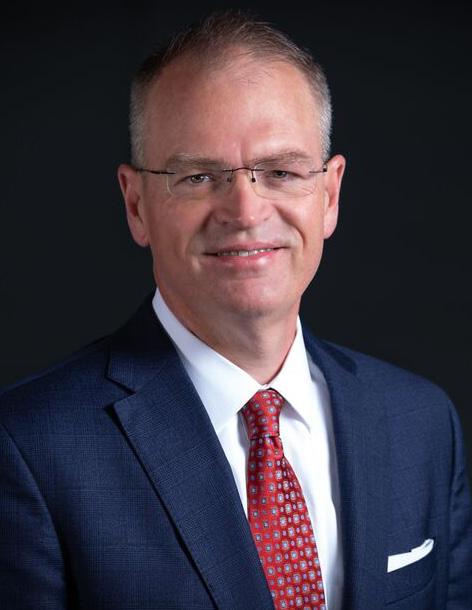

Congratulations to the following Fellows elected to serve a new three-year term on the Board of Directors:
Jeb Joyce
Kathryn Stocks
Judge Chalk Mitchell
Mark Mayfield
Julie Greathouse
Thank you to the Foundation’s new Fellows from the 2024-25 year:
Judge Raymond Abramson
Bourgon Reynolds
William Crowder
Professor Will Foster
David Mitchell
Barrett Moore
J. Baxter Sharp
Congratulations to the 2025 Arkansas Bar Foundation Writing Awards Recipient: W. Taylor Farr for his article in The Arkansas Lawyer magazine Winter 2025 edition:
“Artificial Intelligence 101: The Good, The Bad, and the (Un) Ethical”
Call 501.353.1627 with questions
Memorials
The Arkansas Bar Foundation is grateful for receipt of the following memorial contributions received May 1, 2025 through July 31, 2025.
In MeMory of ralph BradBury, Sr. Don A. Eilbott
In MeMory of roger ColBert
Linda and Tom Womack
In MeMory of BrIan dover
Michael R. Gott
In MeMory of Judge CollInS KIlgore B. Jeffery Pence
In MeMory of davId landIS
Linda and Tom Womack
In MeMory of Judge John langSton
Barbara and B. Jeffery Pence
In MeMory of Sandy MCMath
Barbara and B. Jeffery Pence
In MeMory of Judge don reBSaMen
Don A. Eilbott
B. Jeffery Pence
In MeMory of randy rIddle
B. Jeffery Pence
SCholarShIp ContrIButIonS
Bogle-Sharp
SCholarShIp fund
J. Baxter Sharp
Arkansas Bar Foundation grant applications for law-related projects are due Thursday, October 9, 2025.
Please email apyle@arkansasbarfoundation.com to request an application.

Thursday, September 18, 2025 5:00 to 7:00 pm
Southern Tail Brewing Co. 900 E. 9th Street Little Rock, AR 72202
Vicki S. Vasser President Robert S. Jones Vice-President
Gwendolyn L. Rucker Secretary-Treasurer

Roger U. Colbert, of Paragould, died February 4, 2025, at the age of 67. He earned his law degree from the University of Arkansas at Little Rock William H. Bowen School of Law and practiced in real estate, corporate law, financial institution law, and estates. Colbert served as president of the Greene-Clay Bar Association and as a member of the Arkansas Bar Association House of Delegates.

Ralph Aaron Downs III, of Springfield, Mo., died June 17, 2025, at the age of 78. He served in the U.S. Army from 1970–1973 and earned his Juris Doctor from the University of Arkansas at Little Rock William H. Bowen School of Law in 1993. Downs practiced law late into his life, dedicating his career to helping others.

Charles Davis Frierson III, of Jonesboro, died July 14, 2025, at the age of 93. He earned his Bachelor of Science in Economics from Arkansas State University in 1953 and his LLB and Juris Doctorate from the University of Arkansas School of Law in 1958. Frierson practiced law for 67 years, serving as City Attorney for multiple Arkansas cities and providing counsel to public utilities and districts.

Robert Raymond Keegan, of Fayetteville, died June 21, 2025, at the age of 97. He served in the U.S. Army during the Korean War and earned his law degree from New York University, specializing in patents and trademarks. He practiced as a patent attorney with Darby and Darby in New York City and, in 1973, became the first resident patent attorney in Northwest Arkansas.

Dennis Roy Raebel, of Rogers, died June 17, 2025, at the age of 78. He served in the U.S. Army from 1968–1973 as a noncommissioned officer. He earned his law degree from the University of Memphis Cecil C. Humphreys School of Law in 1990 and practiced law in Memphis, Tennessee, and Rogers, Arkansas.
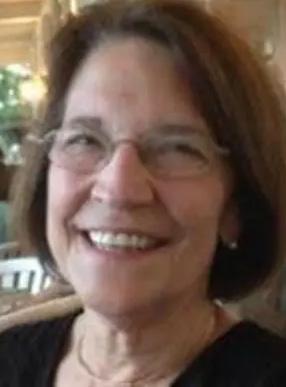
Julia (Judy) Stokes Sayle, of Memphis, Tenn., died January 30, 2025, at the age of 84. She earned her Juris Doctor from the Cecil C. Humphreys School of Law at Memphis State University in 1970 and practiced law with Sayle and Sayle Attorneys. Sayle also served as Assistant Shelby County Divorce Referee for 27 years and was a member of the Shelby County, Tennessee, and Arkansas Bar Associations.

Franklin T. Spencer, of Maumelle, died April 25, 2025, at the age of 77. A native of Fort Smith, Frank earned a bachelor’s degree in business administration from the University of Arkansas in 1970, followed by a master’s degree in advertising from the University of Illinois in 1974. After graduating law school, he was admitted to the Arkansas Bar in 1979. In 1981, he was named the Coordinator of Legal Services for the Arkansas Division of Arkla Gas and later founded a private law practice in Little Rock. Frank will be remembered not only for his legal acumen, but also as a beloved dad, brother, and friend whose warmth and kindness impacted the lives of many.

Judge Robert A. “Bob” Tolson, Jr., of Cleveland County, died July 16, 2025, at the age of 81. He earned his law degree from the University of Houston in 1968 and served as City Attorney of Pine Bluff for nearly two decades before serving 12 years as District Judge of Pine Bluff/Jefferson County.
These memorials are drawn from information published in members’ obituaries.
Attorney Disciplinary Summaries: Final actions from April 1, 2025 –June 30, 2025, by the Committee on Professional Conduct. Summaries prepared by the Office of Professional Conduct (OPC). Full text documents are available online at https://www.arcourts. gov/professional-conduct/opinions. [The “Model” Rules of Professional Conduct are for conduct prior to May 1, 2005. The “Arkansas” Rules are in effect from May 1, 2005.]
INTERIM SUSPENSION:
CRAWLEY, JUSTIN LEE, of Bentonville, Arkansas, ABN: 2016105, in Committee Case No. CPC-2025-009, on a petition before the Committee, by Order of Interim Suspension issued May 16, 2025, was placed on Interim Suspension for allegations of criminal conduct, detailed in Washington County Circuit Court records which posed a substantial threat of serious harm to the public and to his clients. Crawley executed an agreement consenting to the interim suspension.
INTERIM SUSPENSION (MODIFIED):
COPELIN-NEELEY, PRISCILLA, of Dumas, Arkansas, ABN: 2005242, in Committee Case No. CPC-2025-011, on a petition before the Committee, by Order of (Modified) Interim Suspension issued June 13, 2025, was placed on a Modified Interim Suspension in the Tenth Judicial District for allegations of significant misconduct reported by three circuit judges and two prosecuting attorneys, which posed a substantial threat of serious harm to the public and to her clients. Neeley executed an agreement consenting to the modified interim suspension.
CAUTION:
HURST, JOSH QUINCY, of Hot Springs, Arkansas, ABN: 2004016, in Committee Case No. CPC-2019-042, on a complaint by Darlene Carvin, by Consent Findings & Order filed April 21, 2025, was CAUTIONED, assessed costs of $50.00, and ordered to continue $800.00 monthly payments to Carvin until the $45,000.00

judgment is paid in full, for violations of AR Rules 1.1, 1.3, 3.3(a)(1), 8.4(c), and 8.4(d). Hurst failed to timely file Carvin’s pre-trial brief, which caused Carvin to suffer a second dismissal of her claims and eventually lose on appeal a judgment against a third party in the amount of $166,231.00. Hurst executed a consent judgment in the amount of $45,000.00 with Carvin and then ceased making payments after paying approximately $25,000.00 of the judgment.
SHEPPARD,
OLIVIA ANN, of Ashdown, Arkansas, ABN: 2016204, in Committee Case No. CPC-2024-008, on a complaint by Laif Poulton, by Amended Findings & Order filed June 6, 2025, was CAUTIONED, assessed costs of $150.00, and ordered to pay restitution to Poulton in the amount of $3,000.00, for violations of AR Rules 1.1, 1.3, 1.4(a)(4), 1.16(d), 3.2, and 3.4(c). Sheppard failed or refused to communicate with her client, take action on his behalf, or return unearned fees. ■


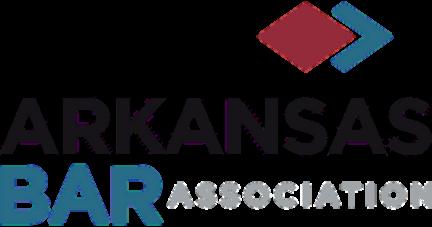
GOLD SPONSORS

SILVER SPONSORS

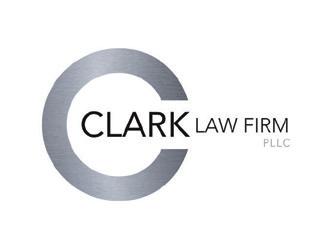


BRONZE SPONSORS

FRIENDS OF ARKBAR SPONSORS
ABA Retirement Funds Program
Arkansas Trial Lawyers Association
Gridiron
Law Office of Jason M. Hatfield P.A.
THURSDAY AFTERNOON RECEPTION SPONSOR
EDUCATION SPONSOR*

Mike Pirnique Photography GScott Media LLC SHOUT OUTS ArkBar Real Estate and Business Law Sections




Sunstar Insurance of Arkansas
TCPrint Solutions
UA Little Rock William H Bowen School of Law University of Arkansas School of Law
Washington County Bar Association JLAP WELLBEING ROOM*

TECHNOLOGY SPONSOR*
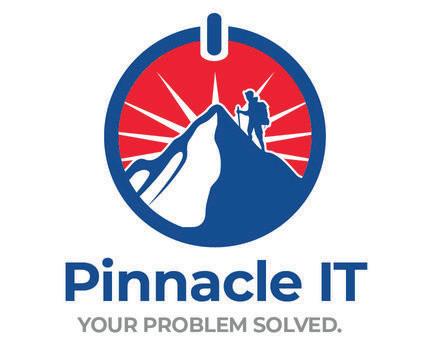
YLS RECEPTION SPONSOR


MEDIA SPONSOR*


